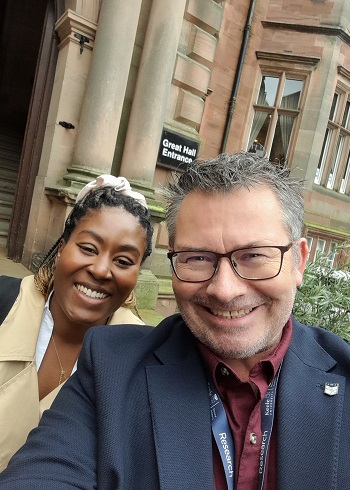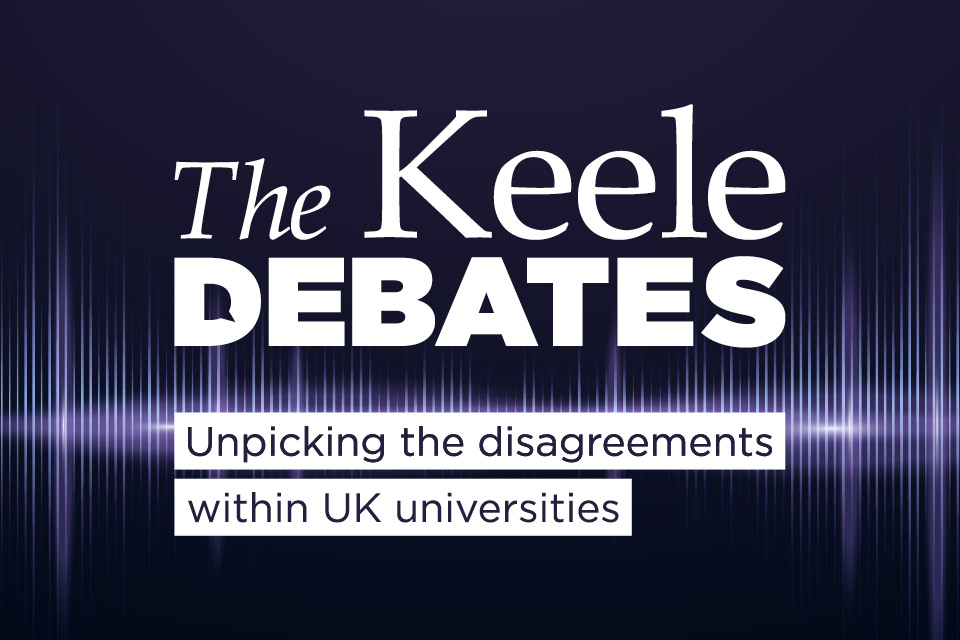Institute of Liberal Arts and Sciences
The Institute of Liberal Arts and Sciences (ILAS) promoted interdisciplinary education and research at Keele and beyond. Its mission was to foster open and collaborative discussion around challenging and contested areas of enquiry, connecting Keele’s research and education.
Interdisciplinary openness has always been part of Keele’s history and identity. ILAS provided a home for this approach, offering opportunities for students and staff to explore ideas that cross traditional boundaries, through innovative teaching, workshops, and public engagement.
Interdisciplinary study at Keele encourages students to think critically, connect ideas, and collaborate across areas of knowledge - preparing them for a complex and interconnected world.
Interdisciplinary research among staff and postgraduate students enables a culture of intellectual curiosity and cooperation, reinforcing Keele’s reputation as a university that values joined-up thinking and innovation.
The Institute helped shape Keele’s modern identity: a place where ideas meet across boundaries, and where education and research work together to address the challenges of our time.
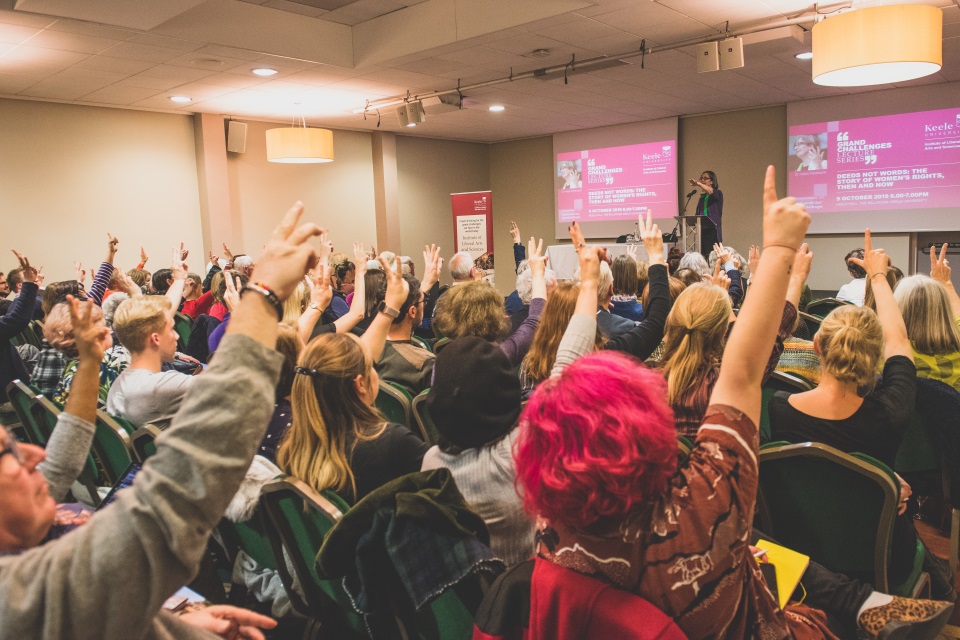
Global Challenge Lecture Programme
A highlight of ILAS’s work was the Global Challenge Lecture Programme, which brought together interdisciplinary perspectives on urgent global topics. These lectures were open to students, staff, and members of the public, contributing to Keele’s international profile and commitment to accessible, outward-facing research and learning.
Playlist of conferences and lectures at ILAS
Past ILAS events, including the Grand Challenges lecture series
2025
Heading South: Patterns in International Student Mobility - whither Keele and the UK?
Professor Antonius Raghubansie: Heading South: Patterns in International Student Mobility - whither Keele and the UK?
17 March 2025
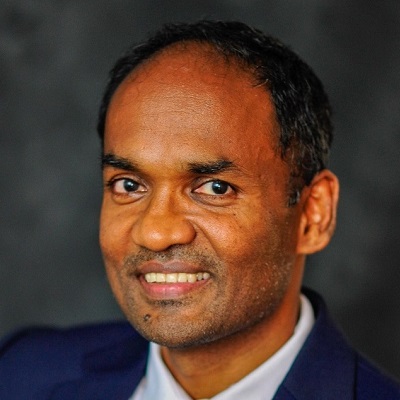
Watch the lecture
If you were unable to attend or would care to revisit the lecture, you can do so on our website here (scroll down to where it says 'Playlist of Conferences and Lectures at ILAS' and select the Playlist icon) and on the Keele 'Lectures and Talks' You Tube page here. The video should be available within approximately one week of the lecture.
The latest in a series of Global Challenge lectures from the Institute of Liberal Arts and Sciences.
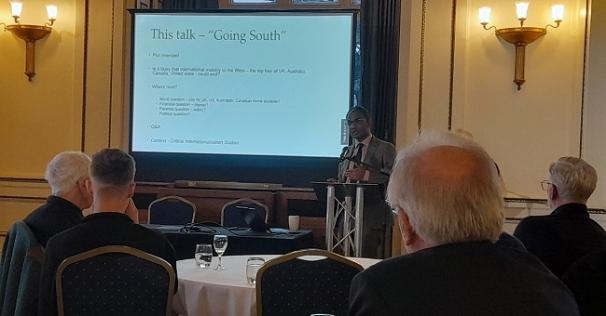
Abstract
With dramatic falls in international students coming to study in the UK in recent intakes, growth in "Global South" international student numbers, restrictions in Australia, UK, Canada and the uncertainty of the US elections, is the boom time over?
Are there new models for engagement? Is this the new normal?
Biography
Professor Antonius Raghubansie became the founding Pro Vice-Chancellor with responsibility for Global Engagement at Keele in 2023. Professor Raghubansie has a global profile and joined us from University of Westminster where he was Head of School of Management & Marketing. Immediately before that he held directorate responsibility in international education in multiple countries in South and East Asia.
Antonius has a background in industry and academia in Marketing and International Management, teaching, researching and consulting. His research explores the impact of digital technology on creative organisations. This is an area he has continued to work on with leading global partners.
Professor Raghubansie has held various leadership roles in the beverages industry and UK HE at School, cross-institution and cross-sector levels, leading education, student experience, sustainability and international projects.
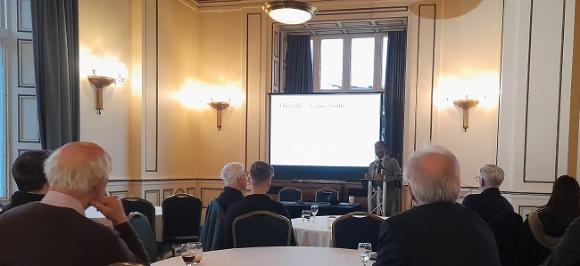
Weaving Solutions: Addressing Fibre and Dye Challenges through Nature and Innovation
Carry Somers: Weaving Solutions: Addressing Fibre and Dye Challenges through Nature and Innovation
3 February 2025
Watch the lecture
If you were unable to attend or would care to revisit the lecture, you can do so on our website here (scroll down to where it says 'Playlist of Conferences and Lectures at ILAS' and select the Playlist icon) and on the Keele 'Lectures and Talks' You Tube page here. The video should be available within approximately one week of the lecture.
The latest in a series of Global Challenge lectures from the Institute of Liberal Arts and Sciences.
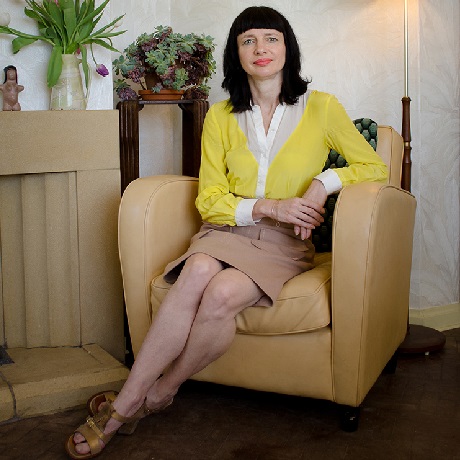
Biography
2024
Building and Maintaining Trust in Politics and Parliament
Daniel Greenberg CB - Building and Maintaining Trust in Politics and Parliament
21 November 2024
Watch the lecture
If you were unable to attend or would care to revisit the lecture, you can do so on our website here (scroll down to where it says 'Playlist of Conferences and Lectures at ILAS' and select the Playlist icon) and on the Keele 'Lectures and Talks' You Tube page here. The video should be available within approximately one week of the lecture.
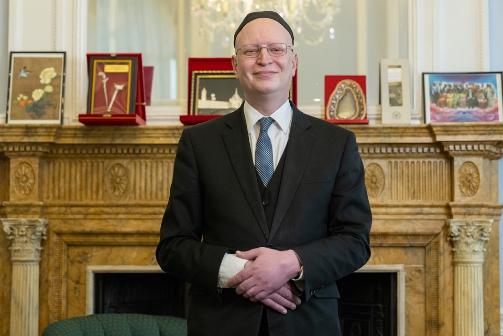
Abstract
Devising and delivering solutions to every global problem requires a foundation of trust between the people and communities affected by the problem and the officials and authorities tasked with addressing it. Lack of trust in our parliamentary and political institutions risks causing those concerned about a range of issues from climate change through to housing, energy and education, to disengage from the democratic process and to look elsewhere for action. In a world of increasing cynicism fuelled by ever more intrusive media expectations and an online world where it is hard to distinguish fact from fiction and rumour from report, how do we build and maintain that trust in our political and parliamentary authorities and institutions that is essential if we are to provide effective transparent and accountable solutions to today’s pressing problems?
Biography
Decolonising and the NHS
Dr Annabel Sowemimo - Decolonising and the NHS
9 October 2024
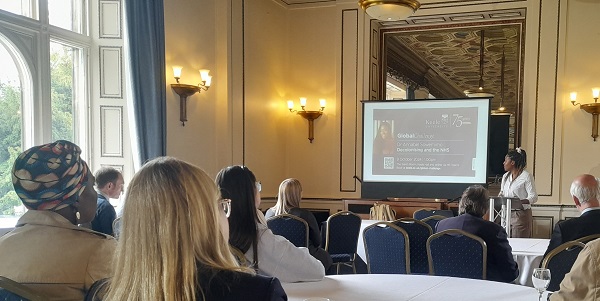
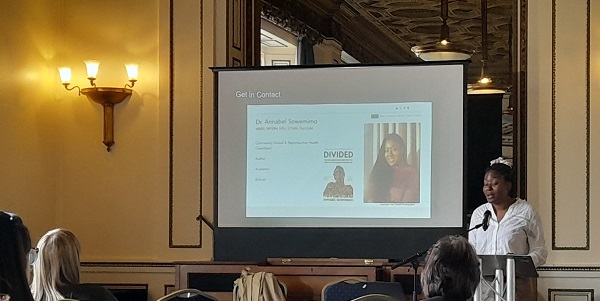
Biography
Mental Health: tackling the challenges, seizing the opportunities
Julie Bentley & Tiger de Souza - Mental Health: tackling the challenges, seizing the opportunities
20 March 2024
A recording of this lecture is not available at this present time.
The latest in a series of Global Challenge lectures from the Institute of Liberal Arts and Sciences.
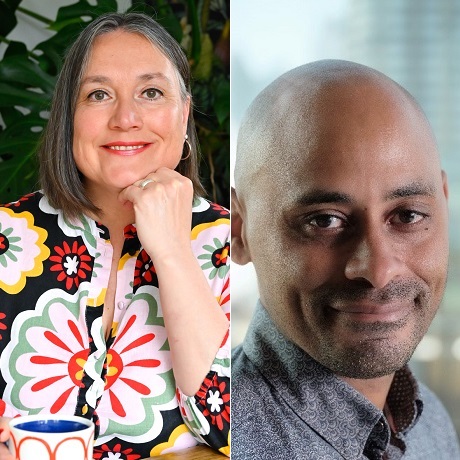
Julie Bentley and Tiger de Souza
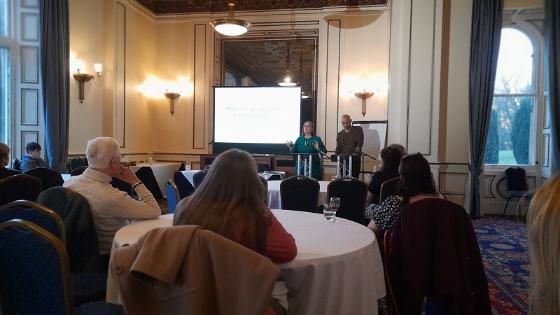
Julie and Tiger opening their lecture in the Salvin Room
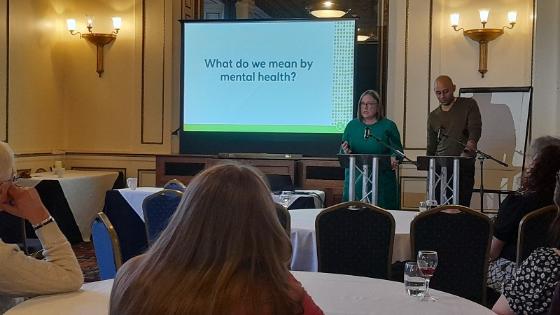
Julie Bentley discussing what is meant by 'mental health'
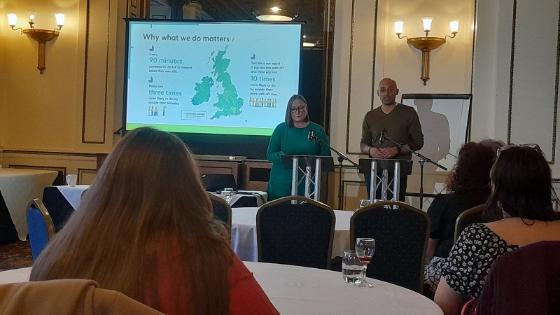
Tiger de Souza providing some background on the work of the Samaritans
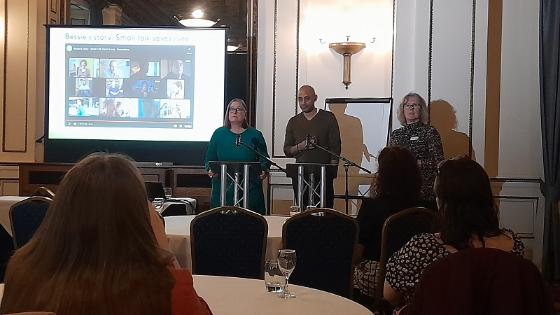
Julie and Tiger with Professor Julie Green (Chair and Head of School of Nursing and Midwifery) taking questions at the end of the lecture
Abstract
The burgeoning awareness and acceptance of mental health in the UK is creating many opportunities to challenge stigma and break down negative feelings of shame. People are increasingly talking openly about their mental health. Whilst exploring the benefits of this more open and accepting attitude to mental ill health we must also be cognisant of the challenges and risks that are emerging as a result.
Julie and Tiger will consider how destigmatising mental ill health is benefitting individuals and society, as well as considering the barriers still faced by many. They will also discuss some of the emerging consequences of much more open discourse on mental health and how we can be equipped as a society to respond.
Biography - Julie Bentley
In Museums We Trust
Professor Tilly Blyth - In Museums We Trust
6 March 2024
Watch the lecture
If you were unable to attend or would care to revisit the lecture, you can do so on our website here (scroll down to where it says 'Playlist of Conferences and Lectures at ILAS' and select the Playlist icon) and on the Keele 'Lectures and Talks' You Tube page here. The video should be available within approximately one week of the lecture.
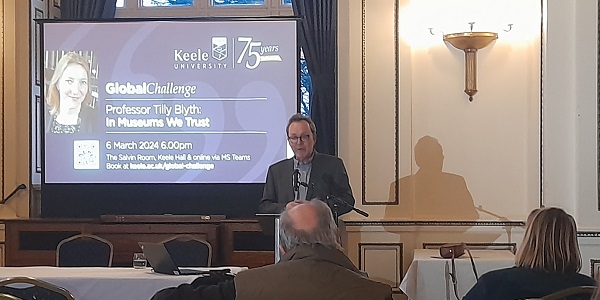
Professor Tilly Blyth being introduced by ILAS Director, Professor Tim Lustig
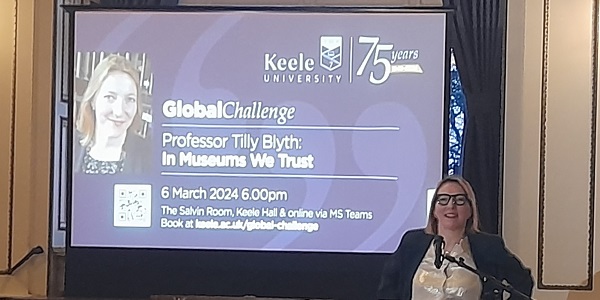
Professor Tilly Blyth opening her lecture in the Salvin Room
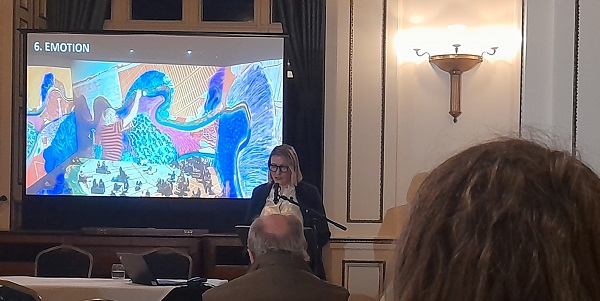
Professor Tilly Blyth concluding her Global Challenge lecture
The latest in a series of Global Challenge lectures from the Institute of Liberal Arts and Sciences.
Abstract
What role can museums play in maintaining or restoring trust in the public realm? Recent polls suggest that museums are some of our most trusted organisations, with museum curators ranking behind nurses, librarians and doctors, but alongside teachers. So what is the basis for this trust and can such trust be retained in the current politically charged environment? In this lecture Professor Tilly Blyth will explore the need for museums to continue to earn the right to that trust and argue that the role of museum curators is changing, from professionals with specialist knowledge and expertise in specific areas of the collections, to collaborators who work alongside local and international partners to build knowledge, confidence and empathy in museum collections and displays.
Biography
Global Challenges facing healthcare delivery in 15BC (Beyond Covid)
Professor Ian Cumming OBE - Global Challenges facing healthcare delivery in 15BC (Beyond Covid)
21 February 2024
Watch the lecture
If you were unable to attend or would care to revisit the lecture, you can do so on our website here (scroll down to where it says 'Playlist of Conferences and Lectures at ILAS' and select the Playlist icon) and on the Keele 'Lectures and Talks' You Tube page here. The video should be available within approximately one week of the lecture.
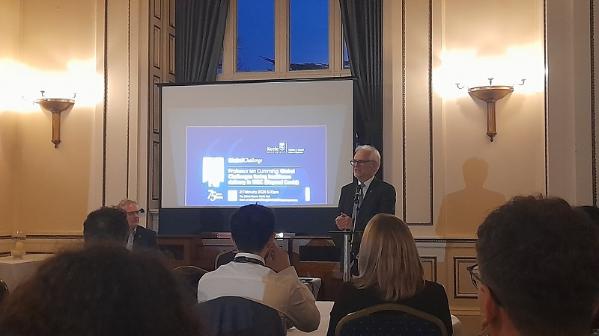
The Vice-Chancellor, Professor Trevor McMillan introduces Professor Ian Cumming
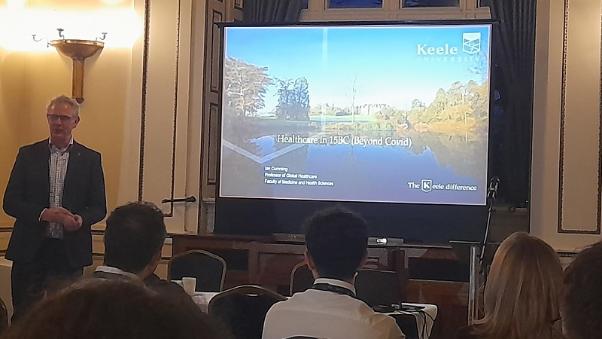
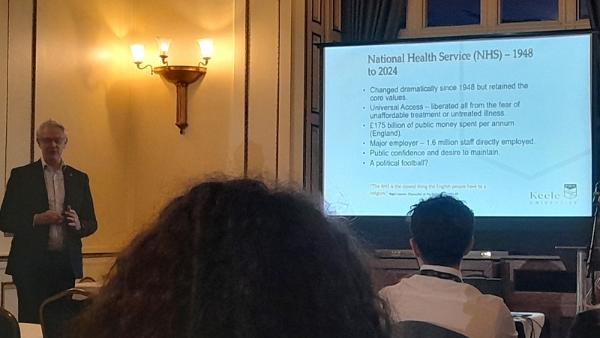
Professor Ian Cumming delivering his lecture in the Salvin Room, Keele Hall
The latest in a series of Global Challenge lectures from the Institute of Liberal Arts and Sciences.
Biography
Professor Ian Cumming OBE, Professor of Global Healthcare Workforce and Strategy, joined Keele in April 2020 and simultaneously took his role as UK Ambassador for Health of Overseas Territories as well as being appointed as the new chairman of West Midlands Ambulance Service Trust.
Prior to his role at Keele, Professor Ian Cumming was Chief Executive of Health Education England (HEE) for eight years, leading the NHS’ arms-length education and training body having previously served 25 years as an NHS Chief Executive.
Professor Cumming is playing a significant role in the Keele Deal | Health and is working with the Institute for Global Health to build international partnerships and educate students on healthcare systems of countries around the world.
Professor Cumming has a particular interest in global healthcare, healthcare leadership and management, training and educations, and pre-hospital care including paramedic science.
Colonialism and Collecting
Dr Tristram Hunt - Colonialism and Collecting
7 February 2024
Watch the lecture
If you were unable to attend or would care to revisit the lecture, you can do so on our website here (scroll down to where it says 'Playlist of Conferences and Lectures at ILAS' and select the Playlist icon) and on the Keele 'Lectures and Talks' You Tube page here. The video should be available within approximately one week of the lecture.
The latest in a series of Global Challenge lectures from the Institute of Liberal Arts and Sciences.
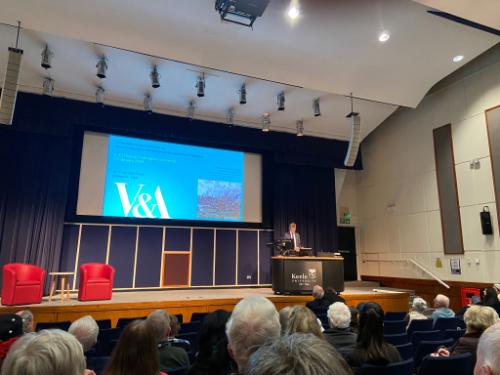
Dr Tristram Hunt addressing the audience in the Westminster Theatre
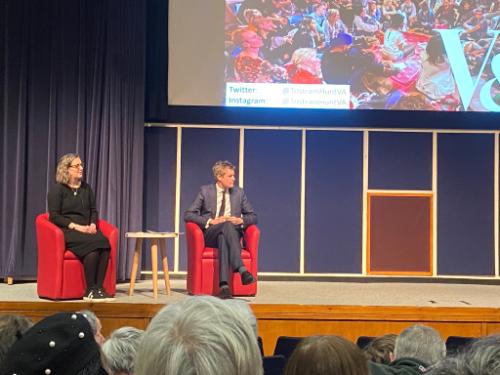
Catrin Jones, Chief Curator at the V&A Wedgwood Collection hosting the Q&A with Tristram
Photos: Professor David Amigoni
The latest in a series of Global Challenge lectures from the Institute of Liberal Arts and Sciences.
Abstract
With a collection born of the East India Company and material whose origins stretch across the British Empire, the ethics and practice of restitution is of growing importance to the Victoria and Albert Museum. In this lecture, historian and V&A Director Dr Tristram Hunt argues that museums should be less concerned about becoming sites of ‘transitional justice,’ adjudicating on the colonial past, and focus more on detailed, trans-national provenance research. Through biographies of objects with so-called ‘contested heritage,’ Dr Hunt will explain the V&A strategy of Renewable Cultural Partnerships and how museums can engage with, and shape, the coming era of restitution and collections equity between the Global North and South.
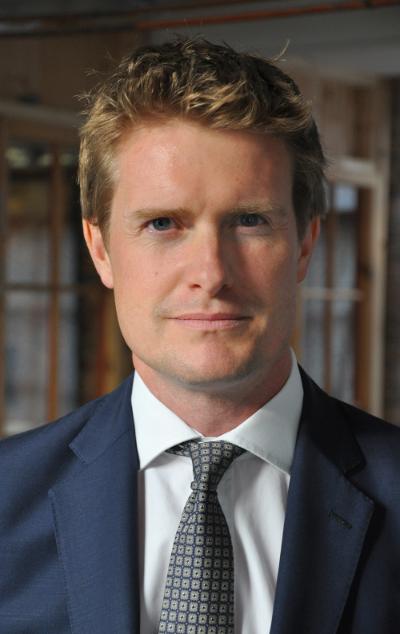
Biography
2023
Race, Inequality and the University: British and American Perspectives
Professors NiCole Buchanan & Keon West - Race, Inequality and the University: British and American Perspectives
15 November 2023
Watch the lecture
If you were unable to attend or would care to revisit the lecture, you can do so on our website here (scroll down to where it says 'Playlist of Conferences and Lectures at ILAS' and select the Playlist icon) and on the Keele 'Lectures and Talks' You Tube page here. The video should be available within approximately one week of the lecture.
The latest in a series of Global Challenge lectures from the Institute of Liberal Arts and Sciences.
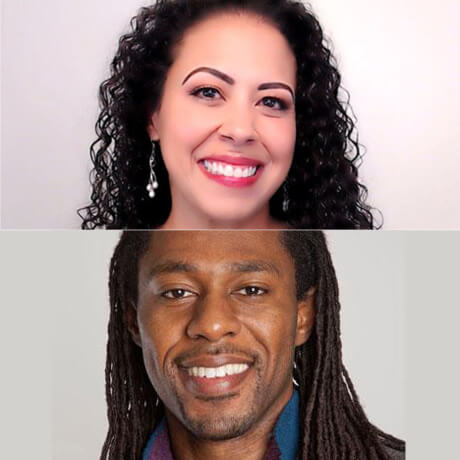
Abstract
Scholars in institutions of higher education face unprecedented challenges to their academic freedom and scholarly autonomy. These burdens, while experienced broadly, may be most keenly felt by those who experience marginalization in academic spaces (e.g., faculty of color, first generation, or queer faculty) and may be most pronounced when these scholars study topics related to their marginalized identities. In this talk, we examine mechanisms that may explain these disparities and how they manifest in both the United States and the United Kingdom. We identify structural and procedural barriers that inhibit academia from achieving diversity goals and reaching its full potential for scholarly innovation (e.g., tokenism, epistemic exclusion, identity-based and scholarly biases). We review the ways in which these challenges reflect and reify racism in academia and discuss strategies to foster greater equity and inclusion in higher education and academic research.
Biography - Professor NiCole Buchanan
Small States at the Crossroads – Does the Maldives Matter?
Dr Farah Faizal - Small States at the Crossroads - Does the Maldives Matter?
18 October 2023
Watch the lecture
If you were unable to attend or would care to revisit the lecture, you can do so on our website here (scroll down to where it says 'Playlist of Conferences and Lectures at ILAS' and select the Playlist icon) and on the Keele 'Lectures and Talks' You Tube page here. The video should be available within approximately one week of the lecture.
The latest in a series of Global Challenge lectures from the Institute of Liberal Arts and Sciences.
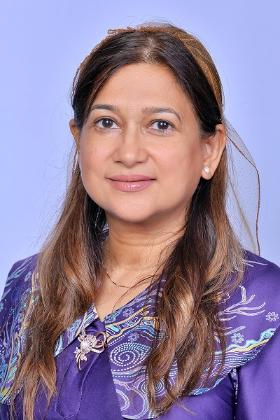
Abstract
In the vast landscape of international relations, the Maldives is more than just the idyllic paradise often depicted in travel brochures. Strategically nestled amidst 26 atolls in the Indian Ocean, it lies near pivotal shipping lanes, placing it at the heart of significant maritime concerns. In fact, around 80% of the world's seaborne oil trade traverses the Indian Ocean, representing one fifth of total ocean trade. Thus, the security and stability of this region—and by extension, the Maldives—are vital for numerous nations, shaping global energy security and trade dynamics.
Beyond its geographical importance, the Maldives also plays a prominent role in the global community as a member of the Commonwealth- a free association of fifty-six sovereign states, most of which were former dependencies of the United Kingdom. In light of the Commonwealth’s ethos of political values, human rights, economic and digital interconnectivity development, the internal politics and the overall political trajectory of the Maldives inherently matter to the UK.
The lecture aims to underline a crucial perspective: the Maldives exemplifies why, in the realm of global geopolitics, even small states can have significant relevance and importance.
Biography
Valuing Visual Literacy
11 October 2023
Whilst the Valuing Visual Literacy project will be based in Stoke-on-Trent and Staffordshire, through the SSTEC partnership, the resources developed will have national, international and global connections. The project will have four key outcomes:
· The creation of a short advocacy film showcasing trainees and mentors using the Superpower of Looking in initial teacher education
· The development of subject specific visual literacy resources for mentors to use when supporting beginning or novice teachers.
· A focus on increasing access to the Superpower of Looking for children with English as an additional language.
· Contributions to conference sessions will share the project ethos and approach.
This work will help contribute to Art UK’s ambition to transform the visual literacy and visual intelligence skills of primary school children by sharing the resource with up to 2,540 trainee teachers, engaging with a minimum of 2,000 teachers, 5,488 classes and 146,518 children.
The Food System Transition – how we can feed ourselves without destroying the planet or our health
Henry Dimbleby - The Food System Transition – how we can feed ourselves without destroying the planet or our health
4 October 2023
Watch the lecture
If you were unable to attend or would care to revisit the lecture, you can do so on our website here (scroll down to where it says 'Playlist of Conferences and Lectures at ILAS' and select the Playlist icon) and on the Keele 'Lectures and Talks' You Tube page here.
You can also watch a short vox pop with Henry on Keele's social media channel here.
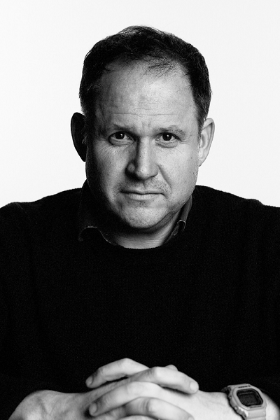
The latest in a series of Global Challenge lectures from the Institute of Liberal Arts and Sciences.
Abstract
The global food system is both a miracle and a disaster. Thanks to the technical advances of the Green Revolution, it now provides almost twice as many calories per head – albeit unevenly distributed – for 8 billion people than it did for 2.8 billion people in the late 1940s, grown on a slightly smaller area of land. But this triumph of human ingenuity has done so much damage to the environment that the food system is now threatening to destroy itself. It is by far the biggest global cause of biodiversity loss, deforestation, soil erosion, freshwater shortage and pollution, and the collapse of aquatic life. And it is also the largest cause of avoidable ill health, destroying our productivity and threatening to overwhelm the health service. Henry Dimbleby will set out why this is happening and what we can do to avert disaster.
Biography
Henry Dimbleby is the author of Ravenous: How to get ourselves and our planet into shape. Published in March 2023, this analysis of the food system – how it is malfunctioning it, and what to do about it – builds on the work he did in the independent National Food Strategy, described by Prue Leith “the best government document that’s ever come out”.
Dimbleby is the co-founder and former CEO of Leon restaurants. He also co-founded the Sustainable Restaurant Association and the charity Chefs in Schools, which brings restaurant chefs into school kitchens. In 2013, he co-authored The School Food Plan, a blueprint for government setting out actions to transform what children eat in schools and how they learn about food. It resulted in the introduction of free school meals for all children up to the age of eight, and cooking lessons being made obligatory for all children up to 14.
From 2018 to 2023, Dimbleby was the lead non-executive board member of the Department for Environment, Food and Rural Affairs, serving under Michael Gove, Theresa Villiers, George Eustice, Ranil Jayawardene and Therese Coffey. He has also advised the Labour party on how to improve the sustainability and security of the food system.
Henry previously worked as a Strategy Consultant at Bain & Company, where he worked with businesses on strategy, performance improvement and organisational design. Before that he worked as a journalist at The Daily Telegraph and a chef at the Michelin-starred Four Seasons Inn on the Park.
Ironbridge, Innovation, and Imagination: Industrial Memory as Global Challenge
A Keele Institute for Social Inclusion/Keele Deal project in collaboration with ILAS and the Ironbridge Gorge Museum Trust
3 July 2023
Watch the round table discussion
If you were unable to attend or would care to revisit this round table discussion, you can do so on our website here (scroll down to where it says Playlist of Conferences and Lectures at ILAS and select the Playlist icon) and on the Keele 'Lectures and Talks' You Tube page here.
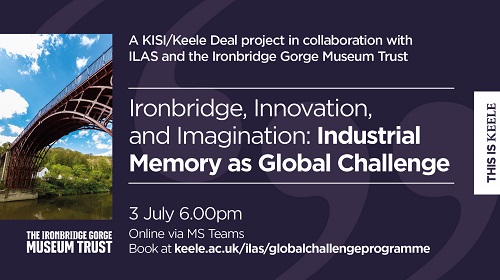
Keele have partnered with the Ironbridge Gorge Museum Trust in a move that will develop student opportunities and open doors for new research into 300 years of industrialisation. You can watch a short video about this new partnership here.
Abstract
As the world moves, however slowly, to a zero-carbon economy, this roundtable discussion will seek out the lessons that our existing industrial heritage might hold for how we deal with this transition. It will bring together voices from Keele University and the Ironbridge Gorge Museum Trust in the first act of an important new partnership, and tackle topics as diverse as how industrial heritage can remain relevant to many different communities, what 'just' means in terms of memory and history, and the challenges and roles for heritage sites in a changing climate.
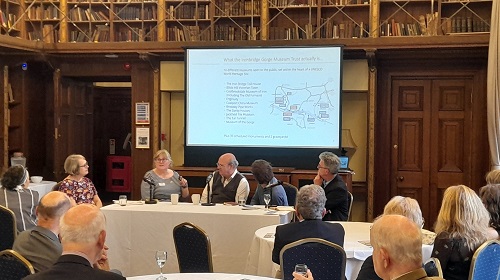
Chair
Professor David Amigoni
David Amigoni is Professor of Victorian Literature and Director of the Keele Institute for Social Inclusion. He has published widely on life writing, culture and science in the Victorian period. He is a member of Ironbridge Gorge Museum Trusts Collections and Learning Committee.
Speakers
Professor Ceri Morgan
Ceri Morgan is Professor of Place-writing and Geohumanities in the School of Humanities and Postgraduate Research Director for Humanities at Keele University. Her teaching specialisms are contemporary literary studies and theory, late twentieth century and twenty-first century fiction, place-writing (poetry, fiction, and creative nonfiction), spatial theory, creative prose, and critical-creative writing.
Dr Ben Anderson
Dr Ben Anderson is a Senior Lecturer in Environmental History at Keele University, with an interest in the material relationships between people and landscape. He has worked on 'decommissioned' infrastructures and their communities, European mountaineering and hill-walking, histories of ultraviolet light, and the potential of creative methods to inform future historical research.
Dr Michael Nevell
Dr Michael Nevell, FSA, MCIfA, is the Industrial Heritage Support Officer for England, at the Ironbridge Gorge Museum Trust. He has more than 30 years of experience as a field archaeologist, and taught undergraduates and post-graduates as a senior lecturer for 18 years at Manchester and Salford universities. A former Chair of the Association for Industrial Archaeology, he is the author of over 100 academic papers and books including the Archaeology of Ironbridge in 20 Digs (forthcoming); the Oxford Handbook of Industrial Archaeology (2022); The Archaeology of Manchester in 20 Digs (Amberley Publishing, 2020), and The Birth of an Industrial City: Glasgow and the Archaeology of the M74 (Society of Antiquaries Scotland 2016). He is President of the Lancashire & Cheshire Antiquarian Society, edits the Association for Industrial Archaeology newsletter, ‘IA News’, is the European Route of Industrial Heritage representative for England, and provides secretarial support for the All Party Parliamentary Group ion Industrial Heritage.
Abbie King
Abbie King is the Chief Operating Officer at the Ironbridge Gorge Museum Trust. She is a Museum professional with over 30 years experience in the sector, and her work has been focused on operations and commercial within the museum world. Her visitor focused, commercial background gives her a valuable insight into the importance of collections, and the importance of collaborative working at the point of contact with museum visitors.
Public Health and the Nanny State
Professor Martin Wilkinson - Public Health and the Nanny State
21 June 2023
Watch the lecture
If you were unable to attend or would care to revisit this lecture, you can do so on our website here (scroll down to where it says 'Playlist of Conferences and Lectures at ILAS' and select the Playlist icon) and on the Keele 'Lectures and Talks' You Tube page here.
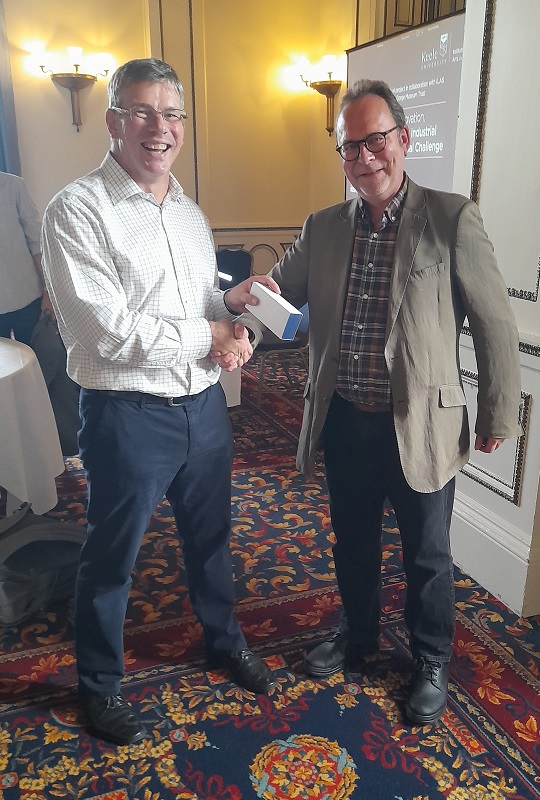
Martin Wilkinson receiving a token gift from ILAS Director, Tim Lustig
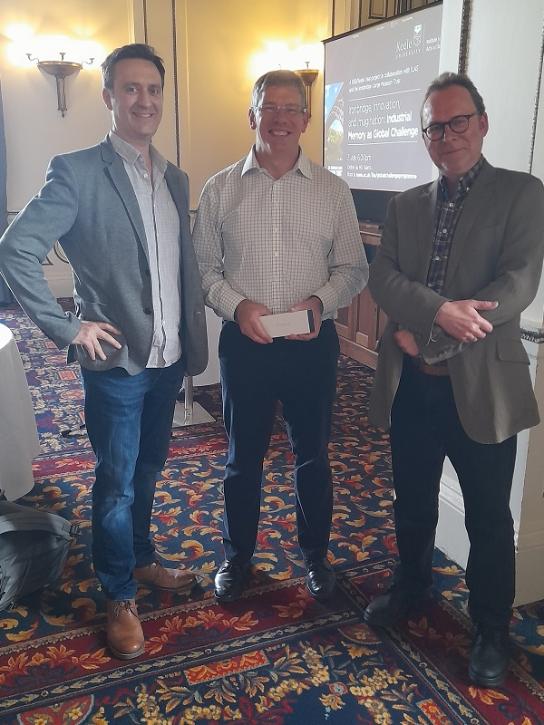
Anthony Wrigley (Chair), Martin Wilkinson and Tim Lustig (ILAS Director)
The latest in a series of Global Challenge lectures from the Institute of Liberal Arts and Sciences.
Abstract
Nanny states treat adults like children, they get too worked up about supposed threats to health and safety, and they like being controlling. Many of us do not want what Angela Ince, a UK columnist, called ‘the whole irritating, complacent, smug, Nanny-knows-best, eat-up-your-nice-spinach-or-your-hair-won’t-curl of today’s Nanny State.’ But many of us want to be healthy rather than ill, and alive rather than dead. Does a state really nanny us when it uses its power to make us healthier? If it does, should it stop? Is it wrong to tax cigarettes heavily, sugar lightly, and alcohol in the middle? Should the density of fast-food outlets be reduced? Should advertising campaigns make smokers feel dirty or guilty?
This talk is about the nanny state criticism of public health. Public health advocates dismiss this criticism as dishonest, or incoherent, or doctrinaire, but I say the nanny state criticism should be taken seriously. I bring out three strands within it:
1) ‘Healthism’: the nanny state gives too much weight to the value of health
2) Autonomy: adults should be free to run their own lives so the state should not impose health on people
3) ‘Scepticism’: doubts that the state or public health practitioners know what they are doing or else, if they do know, that they can be trusted to do it.
Sinister corporate interests and extreme libertarians are among those who complain about the ‘nanny state’. Even so, as we shall see, they often have a point.
Biography
Martin is Professor of Politics and International Relations at the University of Auckland where he teaches and writes on political theory and applied ethics. He was Senior Lecturer and then Associate Professor in the University’s School of Population Health (2003-2009), chair of New Zealand’s Bioethics Council and Deputy Chair of the National Ethics Advisory Committee (two ministerial advisory committees) (2002-2016), and a member of Ministry of Health Expert Advisory Groups. He now serves on the Auckland Hospital Clinical Ethics committee.
Migration in the Maghreb, an interdisciplinary approach: MADAR's motley
Professor Mariangela Palladino - Migration in the Maghreb, an interdisciplinary approach: MADAR's motley
24 May 2023
Watch the lecture
If you were unable to attend or would care to revisit this lecture, you can do so on our website here (scroll down to where it says 'Playlist of Conferences and Lectures at ILAS' and select the Playlist icon) and on the Keele 'Lectures and Talks' You Tube page here.
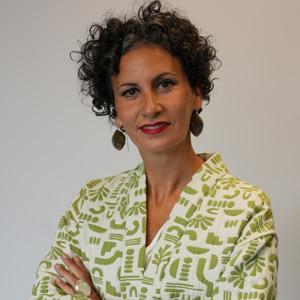
The latest in a series of Global Challenge lectures from the Institute of Liberal Arts and Sciences.
Abstract
The Maghreb Action on Displacement and Rights (MADAR Arabic for 'path') is an international project which deploys an interdisciplinary approach to respond to the complex protection needs of displaced people in the Maghreb. While it is often assumed to be a region of emigration and transit (South-North), the Maghreb is an important migration hub with links to Africa, the Middle East and Europe, it is increasingly a destination, including for thousands of displaced people fleeing conflict and endemic poverty. As a consequence, Maghreb hosts a large number of vulnerable displaced people. Responding to the UN Sustainable Development Goal 16 (to promote peaceful and inclusive societies) MADAR aims to address challenges faced by displaced people across the Maghreb region. This lecture will focus on preliminary findings from the MADAR’s team through a range of case studies in Morocco, Algeria and Tunisia. It will provide insights into challenging field sites, the transformational role of creative methods to engage with research participants and their lived experiences in adverse and volatile socio-political contexts.
Biography
Mariangela Palladino is Professor of Postcolonial and Cultural Studies, and Dean of Research in the Faculty of Humanities and Social Sciences at the University of Keele. Her fields of expertise include postcolonial studies, migration and displacement, participatory methods, research ethics, and African literatures. She is currently Principal Investigator of the UKRI-funded project The Maghreb Action on Displacement and Rights. Mariangela holds degrees from the Università degli Studi di Napoli L'Orientale (Italy) and the University of Strathclyde (UK). Prior to joining Keele, Mariangela has held teaching and research positions in the UK at the Universities of Glasgow and Edinburgh, and in Portugal at the University of Coimbra.
Why is a live music experience so special?
Dr Michelle Phillips - Why is a live music experience so special?
26 April 2023
Watch the lecture
If you were unable to attend or would care to revisit this lecture, you can do so on our website here (scroll down to where it says 'Playlist of Conferences and Lectures at ILAS' and select the Playlist icon) and on the Keele 'Lectures and Talks' You Tube page here.
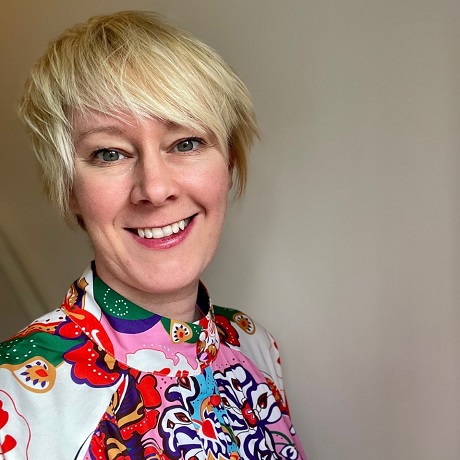
The latest in a series of Grand Challenges lectures from the Institute of Liberal Arts and Sciences.
Abstract
The COVID-19 pandemic deprived us of many aspects of daily life, including coming together to share a performance experience, such as a live music concert or gig. Multiple studies have revealed how much we missed live music during this period, and how our experiences of watching live broadcasts and livestreams were no replacement for in-person attendance. This lecture will discuss recent research undertaken to explore why we value live music so highly, and what it is about this experience that cannot be replicated by a livestreamed performance. Data reveal that a live music experience is not only about the atmosphere, sense of immersion, and physical presence of the event, but also about sharing an experience with other listeners, and with the performers. These findings link to research on the role of music in social bonding, and music as a communal experience. A recent study which used electroencephalography and galvanic skin response measures to look at different neurological and physiological responses to live and recorded music will also be discussed. This study sought to examine whether our non-conscious brain and body responses differ when we experience live vs livestreamed performance, and to further evidence the reason live music holds such a special place in many people’s lives. Overall, this lecture will draw together past and current research on our perceived value of live music, and our conscious and non-conscious responses to a live experience, and suggest implications for listeners, performers, the music industry, and others.
Biography
Michelle is a Senior Lecturer and Deputy Head of Undergraduate Programmes at the Royal Northern College of Music. Her research interests include music and time, perception of contemporary music, audience response to live and recorded music, entrepreneurship, and music and Parkinson’s. She is Principal Investigator of the cross-institution StART Entrepreneurship Project, and is co-lead with Manchester Camerata for a project examining physiological, behavioural and neurological response to live and recorded music, a project funded by the Centre for Cultural Value, University of Leeds.
Lifting the barriers to Black academia – through positive action and decolonisation
Malik Al Nasir - Lifting the barriers to Black academia – through positive action and decolonisation
8 February 2023
Watch the lecture
If you were unable to attend or would care to revisit this lecture, you can do so on our website here (scroll down to where it says 'Playlist of Conferences and Lectures at ILAS' and select the Playlist icon) and on the Keele 'Lectures and Talks' You Tube page here.
You can also download and view the slides from Malik's lecture here: Malik Al Nasir - Presentation Slides.
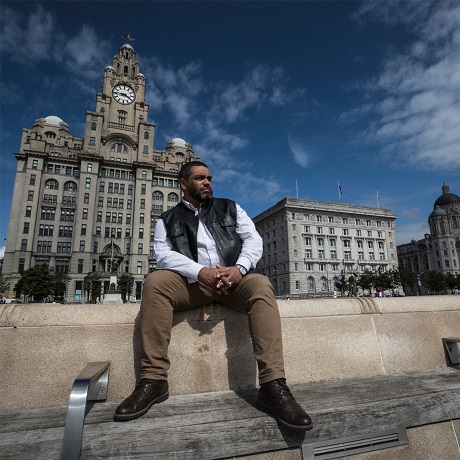
The latest in a series of Grand Challenges lectures from the Institute of Liberal Arts and Sciences and brought to you in partnership with the Race Equality Lecture Series.
Abstract
As a black person growing up in a predominantly white society, there are often a range of intersectional barriers we face, particularly in education. Higher rates of child poverty, often institutionalised and systemic racism within the structures of the society, when added to the historic misconceptions of Black people, fostered through hundreds of years of disinformation – a legacy of enslavement and colonialism – result in a plethora of disadvantage. This often feeds into poorer academic outcomes, than even similarly disadvantaged white children, who do not have the added factors of race to contend with.
Having been taken into care in Liverpool at the age of nine, Malik Al Nasir emerged at eighteen, traumatised, uneducated, and semi-literate. Liverpool City Council released him from their care into a homeless hostel and cut all ties. Despite being totally failed by the education and the care system, Malik was fortunate to meet a poet and civil rights activist Gil Scott-Heron, who mentored him. Using poetry as a tool to become literate, Malik single- handedly reversed much of the damage. He went on to college and university and is currently reading for a PhD at Cambridge, with a full ESRC scholarship. Malik’s memoir ‘Letters to Gil’ (William Collins, 2021) tells this remarkable story.
In 2020, Malik brought together a team of Black academics from the Atlantic-World and co-convened a series of symposia entitled ‘Barriers to Black Academia: Slavery and Colonialism and The Case for Reparative Justice’. A report from the symposia then informed a roundtable with policy makers and Parliamentarians at University of Bristol entitled; ‘Lifting the barriers to Black academia - through positive action and decolonisation. Malik will discuss how working with Universities, and the founder of the ‘All-Party Parliamentary Group on Race Equality in Education’, they are pushing for legislative and policy changes in Parliament and the HE sector in the UK.
By Malik Al Nasir
Biography
Malik Al Nasir is an author, poet and academic from Liverpool. His memoir ‘Letters to Gil’ is a compelling account of his childhood experiences in a brutal UK Local Authority care system, which at eighteen, left him traumatised, semi-literate, homeless, and destitute. A chance meeting with poet and activist Gil Scott-Heron was to prove life changing, setting him on a path to success. Malik is currently reading for a PhD in history at University of Cambridge on a full ESRC scholarship, and he’s just been awarded the prestigious ‘Sydney Smith Memorial Prize’ for ‘outstanding achievement’ at St Catharine’s College, Cambridge.
Follow Mailk at
- Twitter / Instagram: @malikandtheogs
- Blog: http://malikandtheogs.blogspot.com
2022
Soundscape interfaces: Toward a transdisciplinary ecoacoustics for people and planet
Dr Alice Eldridge - Soundscape interfaces: Toward a transdisciplinary ecoacoustics for people and planets 8 December 2022
Watch the lecture
If you were unable to attend or would care to revisit this lecture, you can do so on our website here (scroll down to where it says Playlist of Conferences and Lectures at ILAS and select the Playlist icon) and on the Keele 'Lectures and Talks' You Tube page here.
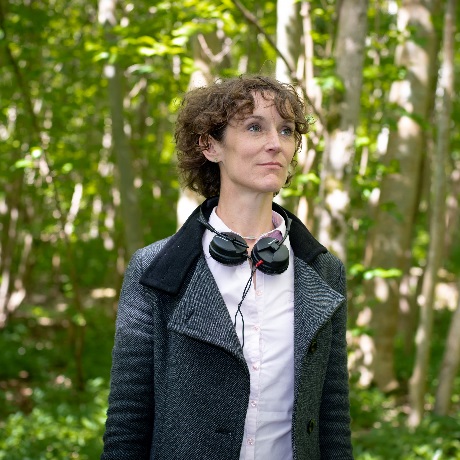
The latest in a series of Grand Challenges lectures from the Institute of Liberal Arts and Sciences.
Abstract
Understanding, managing and recalibrating human-environment relationships is amongst the most pressing challenges of our time. In this talk I point to the value of transdisciplinary soundscape research for approaching ecological, epistemological and existential dimensions of this wicked problem. Introducing the emerging scientific discipline of ecoacoustics, I will share scientific results which point to the possibility that we can better protect our waning biodiversity by listening to ecosystems. Sharing work in community-led conservation projects in south-east Asia and the Ecuadorian Amazon, I reflect on the value of participatory soundscape methods to interface between western and indigenous epistemologies. Finally, turning inward to our own subjective experiences of listening, we will consider what microphenomenology of listening can reveal about our qualities of our basic lived experience. In doing so I aim to illustrate the value of integrating different forms of knowledge across disciplines, everyday and indigenous practices and speculate that triangulating ecological theory and computational methods with human experience might point to valuable new approaches to ecoaoustic analysis and even inspire fresh consideration of core conservation imperatives in order to reintegrate the anthroposphere and biosphere for the benefit of people and planet.
Twitter: @alicealicealice
Website: www.ecolistening.org
Biography
Dr. Alice Eldridge is an interdisciplinarian with an interest in how sound organises systems. Her research integrates ideas and methods from music, computer science, ecology and anthropology to advance theory and methods in the emerging discipline of ecoacoustics, as well as to create ecosystemic music and experiential soundscapes. Alice holds a BSc in Psychology, an MSc in Evolutionary and Adaptive Systems, and a PhD in Computer Science and AI. She is currently a Reader in Sonic Systems at the University of Sussex where she is co-director of the Sussex Humanities Lab, co-director of the Experimental Music Technology Lab and a fellow of the Sussex Sustainability Research Programme.
Chinese Higher Education through English eyes
Professor David Law - Chinese Higher Education through English eyes
16 November 2022
Watch the lecture
If you were unable to attend or would care to revisit this lecture, you can do so on our website here (scroll down to where it says Playlist of Conferences and Lectures at ILAS and select the Playlist icon) and on the Keele 'Lectures and Talks' You Tube page here.
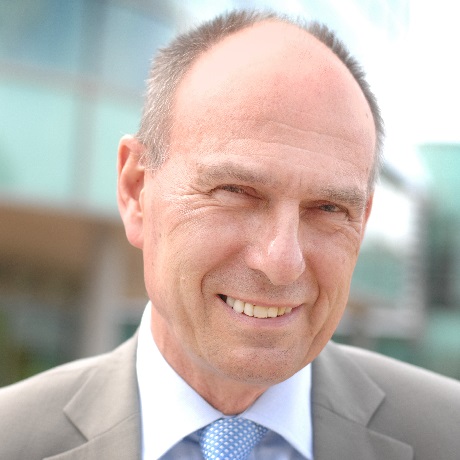
The latest in a series of Grand Challenges lectures from the Institute of Liberal Arts and Sciences.
Abstract
The biggest British export to China is Education (and Higher Education has the lion’s share). Some things we understand well: China is very large, very ambitious, and ruled by the CCP – this shapes how we (in the UK) see Chinese HE. Some things we understand poorly: the historical inheritance from previous centuries, policies to make Chinese HE a global “powerhouse”, continuing integration with other systems. As a historian, Professor Law aims to explain the present by showing how the past continues to be influential. Unlike many historians, he is also happy to discuss what the future might be like.
You can downloand and view David's PowerPoint presentation from the lecture here: Professor David Law - PowerPoint Presentation
Biography
David Law was a ‘frequent flier’ to China before the pandemic, speaking at conferences and visiting many Chinese institutions. Currently he works in the VC’s Office in Keele as Academic Director: Global Partnerships. For twenty years he was a historian at Keele. He has also worked at the Universities of Glasgow, Hull, Warwick, and Edge Hill.
Time for Justice
Michael Mansfield KC - Time for Justice
22 October 2022
Watch the lecture
If you were unable to attend or would care to revisit this lecture, you can do so on our website here (scroll down to where it says Playlist of Conferences and Lectures at ILAS and select the Playlist icon) and on the Keele 'Lectures and Talks' You Tube page here.
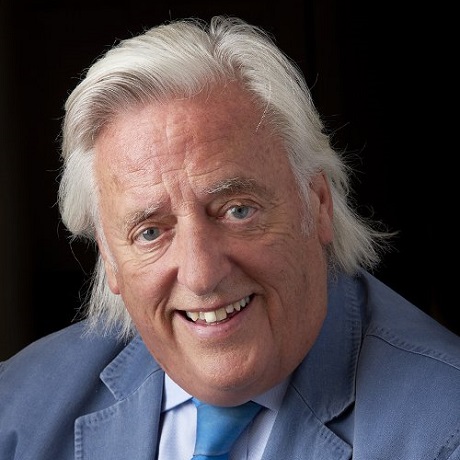
The latest in a series of Grand Challenges lectures from the Institute of Liberal Arts and Sciences.
Abstract
Making a difference with music psychology research
Professor Alexandra Lamont with Professor John Sloboda - Making a difference with music psychology research
4 May 2022
Watch the lecture
If you were unable to attend or would care to revisit this lecture, you can do so on our website here (scroll down to where it says Playlist of Conferences and Lectures at ILAS and select the Playlist icon) and on the Keele 'Lectures and Talks' You Tube page here.
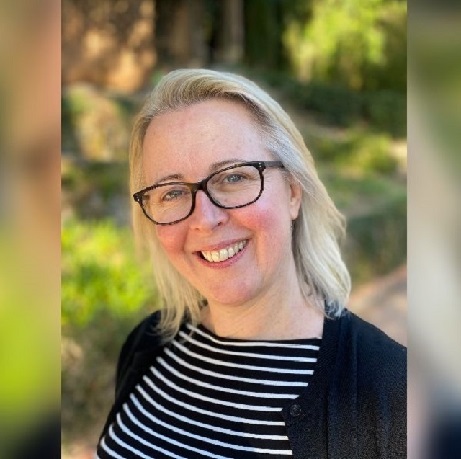
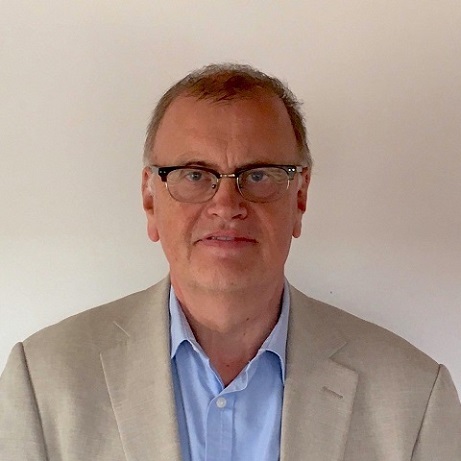
The latest in a series of Grand Challenges lectures from the Institute of Liberal Arts and Sciences. Professor Alexandra Lamont will be delivering this lecture in person and will be joined virtually by Professor John Sloboda OBE.
Abstract
In a post-Covid world, researchers are experiencing considerable pressure to justify the relevance and impact of their work. For some researchers this is an easy task, as their topics and methods have a history of engagement with real-world problems and practical outcomes as well as intellectual and theoretical consequences. For others, this has been more challenging.
This lecture focuses on the field of music psychology. We outline a framework for considering social impact developed earlier in the 21st century and explore its relevance to contemporary research in and after the pandemic. This framework is applicable to any research, but arose from specific dilemmas experienced by one of us (Sloboda). We draw on a recent research project (Lamont) on people's favourite music choices (DIY Desert Island Discs).
Planned before the onset of the pandemic, the project needed to be adapted to fit the needs of its participants as well as to contribute something greater than originally anticipated of value to them and to wider society. We consider the ethical challenges in conducting research in a pandemic, the practical limitations of working without funding and with volunteers, and the ways in which impact can be considered and reconsidered throughout a project to ensure that research is able to respond to these heightened ethical and societal pressures.
Biography - Alexandra Lamont
Alexandra Lamont is currently Professor of Music Psychology at the School of Psychology at Keele University, and is the Director of the University’s Doctoral Academy. She has been a member of academic staff at Keele since August 2001 and has worked across a range of roles in the School of Psychology, Research Institute for Life Course Studies, and the Faculties of Humanities and Social Sciences and of Natural Sciences in postgraduate taught and research education and in internationalisation. As well as music psychology she contributes to teaching in health psychology, happiness and wellbeing, and research methods, and has developed a range of training events in person and online to support doctoral students and their supervisors.
Professor Lamont comes from a multidisciplinary background, having studied and taught in the fields of music, education and psychology, and has diverse research interests relating to how and why music means so much to people. This ranges from studies of infants' responses to familiar and unfamiliar music through to studies with older people in singing groups. In addition to the work featured in this lecture, her current research projects include experimental and qualitative studies of musical memories across the lifespan and between generations, a collaboration exploring people's attachments to physical musical instruments, and a project supported by Keele Institute for Social Inclusion with a local music partner, Make Some Noise, evaluating an early years music programme. She has widely published in journals, book chapters and books, including The Psychology of Musical Development (co-authored with David Hargreaves, published by Cambridge University Press in 2017). As well as numerous roles on editorial boards, she is a former Editor of the journal Psychology of Music and currently serves as a Trustee of the Society for Education, Music and Psychology Research; she recently organised an online conference at Keele for SEMPRE attracting nearly 200 international delegates.
Biography - John Sloboda
John Sloboda is Research Professor at the Guildhall School, where he is founding director of the Institute for Social Impact Research in the Performing Arts. He is also Principal Investigator on the AHRC-funded project "Music for Social Impact: Practitioners' contexts, work, and beliefs". He is Emeritus Professor at Keele and was a staff member of the School of Psychology at Keele from 1974-2008, where he was Director of its Unit for the Study of Musical Skill and Development, founded in 1991.
John is internationally known for his work on the psychology of music. He is a Fellow of the British Psychological Society and has been President of both the Psychology and General Sections of the British Association for the Advancement of Science, as well as President of the European Society for the Cognitive Sciences of Music, where he has served on the editorial board of its journal Musicae Scientiae. He is currently serving a 3-year term as founding President of www.simm-platform.eu, an international platform for research into the Social Impact of Making Music.
He was the recipient of the 1998 British Psychological Society's Presidents Award for Distinguished Contributions to Psychological Knowledge, and in 2004 he was elected to Fellowship of the British Academy. At present he is the first and only Fellow working in the UK conservatoire sector. In 2018, he was awarded an OBE for his services to psychology and music.
His books include Handbook of Music and Emotion (co-edited with Patrik Juslin), and Exploring the Musical Mind, both published by Oxford University Press.
The role of multilateral development organisations in promoting sustainable and inclusive rural transformation with specific reference to the work of the International Fund for Agricultural Development (IFAD) and its contribution to meeting the Sustainable Development Goals (SDGs)
Ashwani K Muthoo - The role of multilateral development organisations in promoting sustainable and inclusive rural transformation with specific reference to the work of the International Fund for Agricultural Development (IFAD) and its contribution to meeting the Sustainable Development Goals (SDGs)
6 April 2022
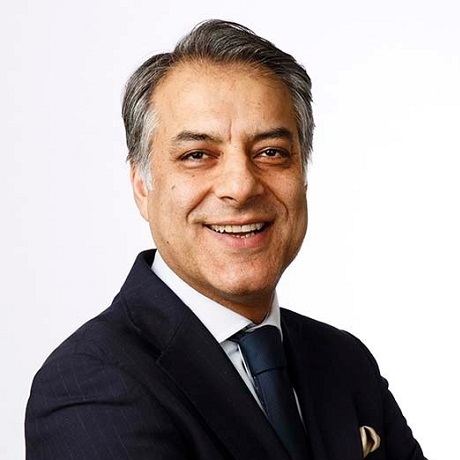
The latest in a series of Grand Challenges lectures from the Institute of Liberal Arts and Sciences.
Abstract
The International Fund for Agricultural Development (IFAD) is a Specialised Agency of the United Nations and an International Financial Institution. Broadly speaking, by providing concessional loans and grants for development projects and programmes, IFAD’s mandate is to assist poor rural people improve their food security, nutritional levels and incomes for better livelihoods. As a multilateral development organisation, IFAD plays an important role in social and economic transformation in developing countries, and its work spans all geographic regions.
This lecture by Ashwani Muthoo will specifically highlight the opportunities and challenges of how smallholder agriculture and rural development is critical for meeting the Sustainable Development Goals (SDGs) by 2030. He will touch upon themes such as climate change, promotion of gender equality, improvements in agricultural production and productivity, access to markets, private sector development, and related topics. He will also underline the importance of ex-ante quality assurance and evaluations of policies, strategies and operations for enhanced results and sustainability of benefits.
You can download a copy of Ashwani's presentation from the evening here: Ashwani Muthoo - Grand Challenges Lecture.
Biography
Ashwani K. Muthoo is the Director of the Quality Assurance Group in the Office of the President and Vice President at the International Fund for Agricultural Development (IFAD). Ashwani has been recently appointed by the Board of Directors of the BRICS New Development Bank (NDB), as the first Director General of the Independent Evaluation Office of the NDB at their headquarters in Shanghai. Ashwani will take up his new role on 18 April 2022, reporting directly and exclusively to the Bank’s Board of Directors.
He has around 30 years of professional and managerial experience, focusing on global policies, country strategies, development projects and programmes, evaluation, and issues in the agricultural and rural sectors. His work experience covers more than 50 developing countries in Africa, Asia, Latin America and the Caribbean, and Near East and North Africa regions.
He was previously Director of the Global Engagement and Multilateral Relations Division and Director of the Global Engagement, Knowledge and Strategy Division. In these roles, an important part of his responsibilities included South-South and Triangular Cooperation work. He also served as Deputy Director in the Independent Office of Evaluation (IOE) of IFAD.
Ashwani Muthoo has a Master's degree in Data Engineering and a Bachelors with Honors in Management and Computer Science, from Keele University. He is fluent in English, Hindi, Italian, and Portuguese, and has some knowledge of French and Spanish.
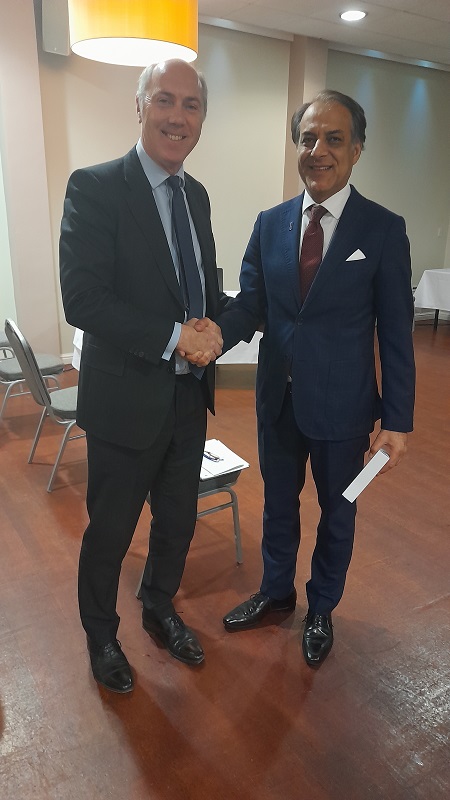
Professor Jonathan Wastling with Ashwani Muthoo
No Label: The limits of human categories
Angela Saini - No Label: The limits of human categories
16 February 2022
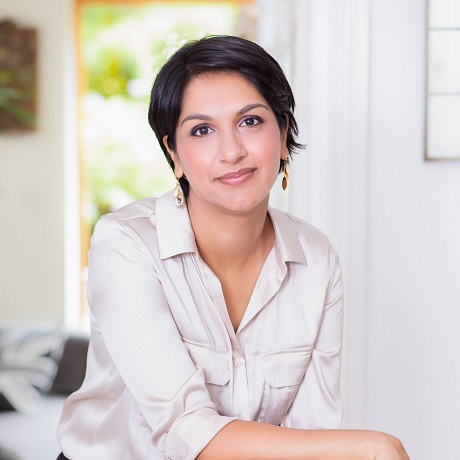
The latest in a series of Grand Challenges lectures from the Institute of Liberal Arts and Sciences and brought to you in partnership with the Race Equality Lecture Series.
Abstract
Modern science has from its outset sought to categorise human groups and ascribe meaning to those categories, whether they be race, ethnicity, sex, or gender. But where has this endeavor failed, and what damage does it still do to accurate understandings of human variation? Science journalist Angela Saini explores the history of human labelling, and why researchers would benefit from thinking beyond fixed, discrete categories.
Biography
Angela Saini is an award-winning science journalist and author. She presents radio and television programmes, and her writing has appeared across the world, including in The Financial Times, Wired, New Scientist, and National Geographic.
Angela's latest book, Superior: The Return of Race Science, was published in May 2019 to enormous critical acclaim, and became a finalist for the LA Times Book Prize and the Foyles Book of the Year. Inferior: How Science Got Women Wrong was published in 2017, and has been translated into fourteen languages. She is now working on her fourth book, exploring the roots of male domination and patriarchy, which will be published by 4th Estate and Beacon Press in early 2023.
In 2020 Angela was named one of the world's top 50 thinkers by Prospect magazine, and in 2018 she was voted one of the most respected journalists in the UK. In 2015 she won the American Association for the Advancement of Science's Kavli Science Journalism gold award for a BBC Radio 4 documentary about birdsong and human language. She has also received a best feature award from the Association of British Science Writers.
Angela started her career with ITN on its news trainee scheme, before joining the BBC as a reporter, where her six-month investigation into bogus universities featured on the flagship national News at Ten and won a Prix Circom European television news award.
She has a Masters in Engineering from Oxford University, and a second Masters in Science and Security from the Department of War Studies at King’s College London. Between 2012 and 2013 she was a Knight Science Journalism Fellow at the Massachusetts Institute of Technology. And she has given distinguished and keynote lectures at Yale, Princeton, Oxford, among other notable institutions.
Angela is the founder of 'Challenging Pseudoscience', at the Royal Institution of Great Britain, and she sits on the Lancet Covid-19 Commission Task Force on Global Health Diplomacy. She is on the board of the Association of British Science Writers. In 2019 she was made an Honorary Fellow of the British Science Association.
2021
The elimination of violence against all women: the grand challenge facing us today
Pragna Patel - The elimination of violence against all women: the grand challenge facing us today
25 November 2021
Watch the lecture
If you were unable to attend or would care to revisit this lecture, you can do so on our website here (scroll down to where it says Playlist of Conferences and Lectures at ILAS and select the Playlist icon) and on the Keele 'Lectures and Talks' You Tube page here.
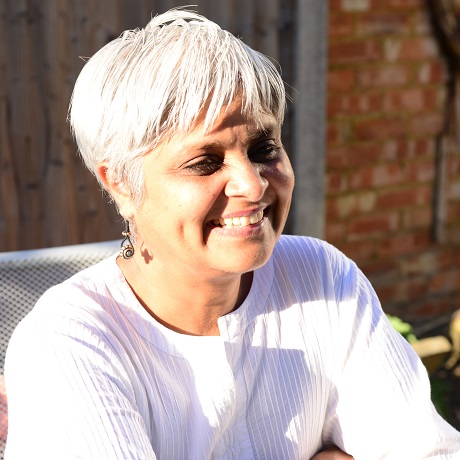
Violence against women and girls remains persistent throughout the world. As we witness the countless atrocities committed against women, we must also acknowledge the many struggles for freedom and justice waged by women everywhere. However, despite the gains that have been made, many challenges remain unaddressed in the UK as elsewhere. Violence against women is an expression of patriarchal power and gender inequality entrenched at all levels of society, but it is not experienced by all women equally. In this talk, I want to reflect on the many silences and gaps in protection and justice that still endure. I explore the reasons why some women are not included in the wider public discourse, laws and policies on eliminating violence against women and girls; why institutional failings continue; and why, ultimately, there can be no end to violence and inequality without women rising up to demand freedom for all.
Biography
Pragna Patel is a founding member and director of Southall Black Sisters (SBS) - an advocacy and campaigning centre. Established in 1979 to meet the needs of black and minority women, the bulk of SBS’ work is directed at assisting women and children obtain effective protection and assert their fundamental human right in the face of gender-based violence and related problems. Over the years, Pragna has been centrally involved in some of SBS’ most important cases and campaigns on domestic violence, immigration and religious fundamentalism. She has also written extensively on race, gender and religion and on the need to address multiple and overlapping forms of discrimination that create injustice and inequality.
The value of exploration
Paul Rose - The value of exploration
17 November 2021
Watch the lecture
If you were unable to attend or would care to revisit this lecture, you can do so on our website here (scroll down to where it says Playlist of Conferences and Lectures at ILAS and select the Playlist icon) and on the Keele 'Lectures and Talks' You Tube page here.
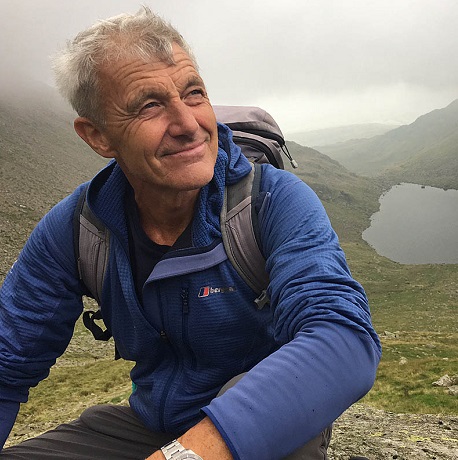
We’ve never needed an 'explorers mindset' more than we do today!
The COVID pandemic, caused by our broken relationship with nature, provides a sharp focus on our values and a timely reminder that our health is dependent on everyone else’s health, which in turn is dependent on the health of our planet. Science has provided us with vaccines, but the only true vaccine against further pandemics is to re-address our relationship with nature. Three steps to do that are:
1. Protect what we have.
2. Restore what has been damaged.
3. Reset our values so that it doesn't happen again.
Big challenges indeed and the only way to approach them is with an enthusiastic explorers mindset.
I look forward to joining you for this lecture and to your insights and difficult questions!
Biography
Paul Rose is a man at the front line of exploration and one of the world’s most experienced science expedition leaders. Paul helps scientists unlock and communicate global mysteries in the most remote and challenging regions of the planet.
A former Vice President of the Royal Geographical Society, Paul is currently Expedition Leader for the National Geographic Pristine Seas Expeditions.
The Royal Geographical Society has awarded Paul the Ness Award and the Founders Gold Medal.
A broadcaster, published author and journalist, he presents BBC television programs on current affairs, science and the environment.
He is Ambassador for the UN Basel, Rotterdam and Stockholm Conventions.
Paul was the Base Commander of Rothera Research Station, Antarctica, for the British Antarctic Survey for ten years and was awarded HM The Queen's Polar Medal. For his work with NASA and the Mars Lander project on Mt Erebus, Antarctica, he was awarded the US Polar Medal.
A mountain in Antarctica is named after him.
Website: www.paulrose.org Twitter: @Paul_Rose
From What If to What Next: how to build an imagination infrastructure
Rob Hopkins - From What If to What Next: how to build an imagination infrastructure
13 October 2021
Watch the lecture
If you were unable to attend or would care to revisit this lecture, you can do so on our website here (scroll down to where it says Playlist of Conferences and Lectures at ILAS and select the Playlist icon) and on the Keele 'Lectures and Talks' You Tube page here.
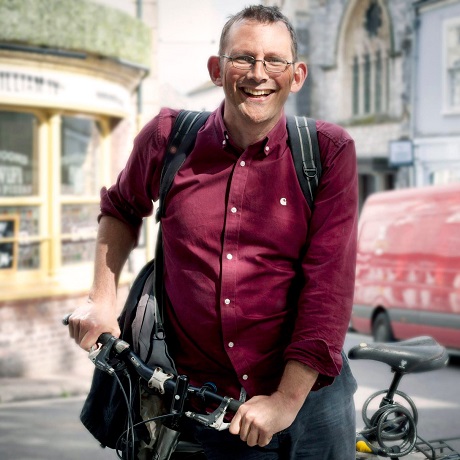
In this talk, Rob Hopkins will explore the question of why it might be, at the very time in history when the climate emergency demands that we reimagine and rebuild everything, that our imaginations don't seem to be up to the task. Are we living in a time of imaginative poverty? We cannot build what we cannot imagine. So the kind of radically low carbon, more resilient, more local, more connected, diverse and nourishing future that our survival depends upon, can only come into reality if we focus on creating the best possible conditions for the rapid expansion of our collective imagination. How to do that? Using examples, stories and participatory exercises, Rob will lead us into how we might catalyse that, how we might create longing in society for a low carbon future, and how living through a 'revolution of the imagination' could be the best thing that ever happened to us.
Biography
Rob Hopkins is co-founder of Transition Network and Transition Town Totnes, and author of several books, including 'The Transition Handbook', 'The Power of Just Doing Stuff' and most recently, 'From What Is to What If: unleashing the power of imagination to create the future we want'. He presents the 'From What If to What Next' podcast, and does a lot of public speaking and writing. He is also a founder Director of the New Lion Brewery in Totnes, the UK's first 100% community-owned brewery, and of Totnes Community Development Society. He holds a Phd from the University of Plymouth, as well as two honorary doctorates, from University of the West of England and from Namur in Belgium. He is a member of the National Steering Group of the Food, Farming and Countryside Commission. His blog is robhopkins.net and in his spare time he gardens, draws and makes lino prints.
Twitter: @robintransition
COVID-19 and global vaccine access: from equity to nationalism
Dr Mark Eccleston-Turner - COVID-19 and global vaccine access: from equity to nationalism
13 October 2021
Watch the lecture
If you were unable to attend or would care to revisit this lecture, you can do so on our website here (scroll down to where it says Playlist of Conferences and Lectures at ILAS and select the Playlist icon) and on the Keele 'Lectures and Talks' You Tube page here.
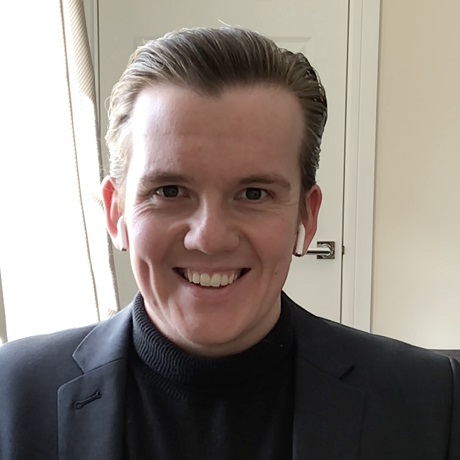
The invention of safe and effective vaccines to combat COVID-19 is a milestone for humanity; allowing us to escape the acute phase of the pandemic, suppressing mortality and morbidity caused by infection and restoring a degree of normality to social life and the global economy. However, access to vaccines is deeply unequal; while the wealthiest countries consider third-dose booster, and immunising children, only 1% of people living in low-and-middle-income countries have received just one dose of a COVID-19 vaccine. This is a public health problem, and, in the words of the Director-General of the WHO, a moral catastrophe. In this talk, Dr. Mark Eccleston-Turner explores the cause of this inequity, the morality of it, and potential solutions to improve access to COVID-19 vaccines around the world.
Biography
Dr Mark Eccleston-Turner is a Senior Lecturer in Global Health Law at Kings College London. His research specialism is in the field of international law and infectious diseases. He has published extensively on international law and infectious diseases, including most recently, a co-authored monograph on the declaration of a Public Health Emergency of International Concern. He has held appointments as the Visiting Fellow at the Brocher Foundation in Geneva, and as an Emerging Leader in Biosecurity Fellow at the Johns Hopkins Center for Health Security. Dr Eccleston-Turner has also worked as a Consultant to the World Health Organisation on procurement of pandemic vaccines.
Twitter: @MarkRTurner
Competing inequalities: gender, race and white privilege in higher education institutions in the UK
Professor Kalwant Bhopal - Competing inequalities: gender, race and white privilege in higher education institutions in the UK
22 April 2021
Watch the lecture
If you were unable to attend or would care to revisit this lecture, you can do so on our website here (scroll down to where it says Playlist of Conferences and Lectures at ILAS and select the Playlist icon) and on the Keele 'Lectures and Talks' You Tube page here.
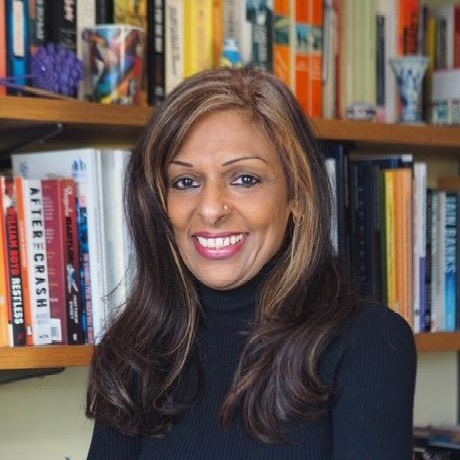
Brought to you in partnership with the Race Equality Lecture Series.
This lecture will explore research on the Race Equality an Athena Swan charters and argue that gender has taken precedence over race in policy making, resulting in a discourse of competing inequalities in higher education.
Biography
Kalwant Bhopal is Professor of Education and Social Justice, and Director of the Centre for Research on Race and Education at the University of Birmingham. Kalwant’s research focuses on the achievements and experiences of minority ethnic groups in education. She has conducted research on exploring discourses of identity and intersectionality examining the lives of Black minority ethnic groups as well as examining the marginal position of Gypsies and Travellers. Her research specifically explores how processes of racism, exclusion and marginalisation operate in predominantly White spaces with a focus on social justice and inclusion. Her recent book, White Privilege: the myth of a post-racial society was published by Policy Press. She is working on a new book (with Martin Myers) exploring elites, privilege and higher education, which will be published by Routledge in 2021.
Twitter: @KalwantBhopal
Are we all in it together? Policing Human Rights, Security and Democracy during the Covid-19 pandemic
Professor Clifford Stott - Are we all in it together? Policing Human Rights, Security and Democracy during the Covid-19 pandemic
3 March 2021
Watch the lecture
If you were unable to attend or would care to revisit this lecture, you can do so on our website here (scroll down to where it says Playlist of Conferences and Lectures at ILAS and select the Playlist icon) and on the Keele 'Lectures and Talks' You Tube page here.
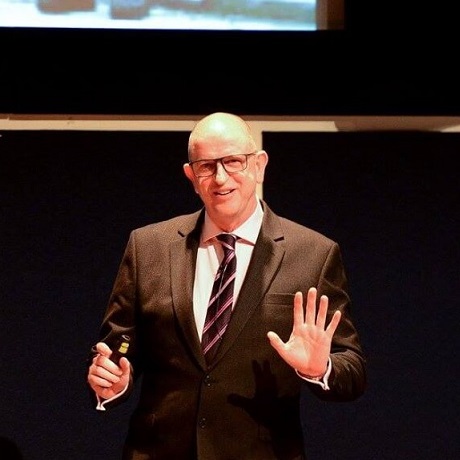
The Covid 19 pandemic has exposed multiple and complex ‘Grand Challenges’ to human society. The highly contagious nature of the virus, its mode of transmission, age range impacts and fatality rate have all been critically important factors threatening lives and health care systems across the planet. As the outbreak developed societies began to recognise that the disease had profound implications, for which the UK was ill prepared. This was despite the country’s relatively highly advanced ‘off the shelf’ civil contingency preparations. In the absence of vaccination, the capacity of nation states to control public behaviour was the key, and perhaps only, weapon in fighting transmission. Consequently, an unprecedented ‘germ governance’ response from Governments internationally began to take shape. International norms pushed and pulled nation states in the direction of highly securitised ‘lockdowns’ allowing for draconian constraints of basic democratic freedoms and increased powers of police enforcement.
In this talk, Professor Stott explored some of the specific security and policing dimensions of this unprecedented threat to our societies. In particular, he focued on how a programme of research and theory on the social psychological dynamics of riots and policing has interfaced dynamically with policy and practice decisions in the context of the Covid-19 pandemic in the UK. In so doing he drew out some of the lessons about the value of the behavioural and social sciences within the pandemic in helping to understand and address some of the complex challenges the UK has had to address. In particular, he discussed how our research programme and ethos at Keele has interfaced with Government policy through the Behavioural Science sub-Committee of the Scientific Advisory Group in Emergencies (SAGE), with regards to issues of compliance with and enforcement of public health guidance. Professor Stott concluded by suggesting some of the lessons we might take forward in terms of understanding how Universities can best be positioned to feed research meaningfully into the policy environment during the future global challenges and mass emergencies we will inevitably have to face.
Biography
I am currently a Professor of Social Psychology in the School of Psychology, Dean for Research in the Faculty of Natural Sciences, and Director of the Keele Policing Academic Collaboration (KPAC), one of Keele’s Strategic Research Centres. I joined Keele in March 2016 from a position as Principal Research Fellow in Security and Justice in the School of Law at the University of Leeds. I have an interdisciplinary focus and specialize in understanding the nature and role of social identity processes and intergroup relationships in the psychology and dynamics of crowd behaviour, ‘riots’, ‘hooliganism’ and ‘public order’ policing. I have held Lectureships and Senior Lectureships at the Universities of Bath, Abertay Dundee and Liverpool. I have also held Visiting Professorships at Aarhus University in Demark, at the Leeds University Business School along with Visiting Fellowships and Scholarships at the Australian National University, the University of Exeter and Flinders University in Adelaide.
Twitter: @cliffordstott
Has wellbeing’s moment finally arrived? The challenge of making and measuring social progress
Sarah Davidson - Has wellbeing's moment finally arrived? The challenge of making and measuring social progress
17 February 2021
Watch the lecture
If you were unable to attend or would care to revisit this lecture, you can do so on our website here (scroll down to where it says Playlist of Conferences and Lectures at ILAS and select the Playlist icon) and on the Keele 'Lectures and Talks' You Tube page here.
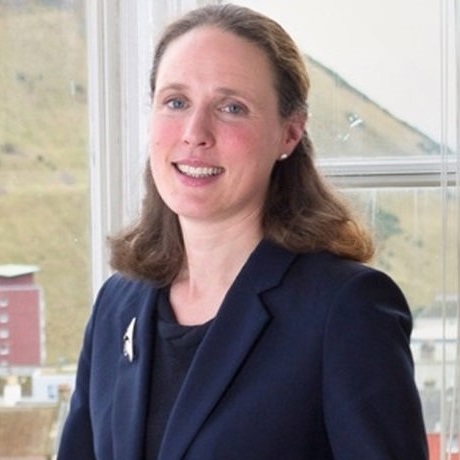
What makes life worthwhile? This is not a new question by any means, but it is one that has become much more tangible for most of us over the past twelve months. Is this a personal question best remitted to the private domain, or should it be regarded as the fundamental purpose of good government to pursue strategies that will lead to the goal of “societal wellbeing”, meaning that everyone has what they need to live well now and in the future?
In this lecture, Sarah argues that the Covid crisis and the recovery from it has provided vital context to assert the latter. The crude caricature of decisions currently facing governments as an “economy versus public health” face-off is an example of the reductive narrative associated with the absence of a holistic approach to wellbeing. If governments are serious about “building back better”, then they need to embrace a conversation; a goal; a framework; and an overall approach that puts wellbeing at the centre.
Sarah also talks during her lecture about the work carried out by CarnegieUK Trust on (Gross Domestic Wellbeing (GDWe). You can find more information about this on the CarnegieUK Trust website: Gross Domestic Wellbeing (GDWe): an alternative measure of social progress (carnegieuktrust.org.uk).
Biography
Sarah Davidson is CEO at the Carnegie UK Trust, an organisation which seeks to improve the lives and wellbeing of people across the UK and Ireland through influencing public policy and practice.
She joined the Trust in 2019 after a 25 career in the Civil Service, latterly in Director General roles in the Scottish Government.
Sarah was made a CB for public service in 2019. She is a Fellow of the RSA.
She lives in Edinburgh and works across the UK and Ireland from the Carnegie Trust’s base in Dunfermline.
Twitter: @CEO_CarnegieUK
2020
Politics, religion, and freedom: is secularism failing and does it matter?
Andrew Copson - Politics, religion, and freedom: is secularism failing and does it matter?
4 November 2020
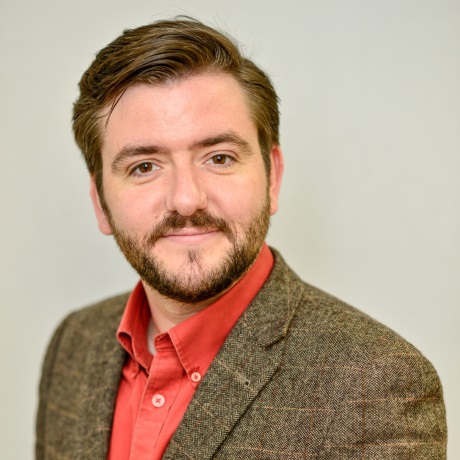
Secularism is an increasingly hot topic in public, political, and religious debate across the globe. It is embodied in the conflict between the constitutions of secular republics – from the US to France to India – and the challenges they face from resurgent religious identity politics, from ethnic nationalism, from rising cultural conservatism and from the general onslaught against human rights and the liberal order. This talk will look at the arguments against secularism and the conflicts that they are provoking around the world today and ask whether secularism is failing as a political order and whether it matters. We will look at the origins of secularism in modern states and historic opposition to secular political orders before focussing on France, India, the US, and Turkey to highlight the specific challenges faced by secularism and consider whether they are part of a general global trend.
Biography
Andrew Copson is Chief Executive of Humanists UK and President of Humanists International. His last book, Secularism: Politics, Religion, and Freedom (2017) was re-published in 2019 by Oxford University Press as 'Secularism: a very short introduction' and widely hailed as an indispensable analysis of the problems and challenges facing states in relation to religion and politics today. Andrew has fifteen years of practical experience representing humanist and secularist concerns nationally and internationally including as an adviser to the UK Foreign and Commonwealth Office and as an NGO delegate to the Council of Europe and the United Nations.
Twitter: @andrewcopson
Politics, religion, and freedom: is secularism failing and does it matter?
Is impact your grand challengs?
Dr David J Phipps - Is impact your grand challenge?
21 October 2020
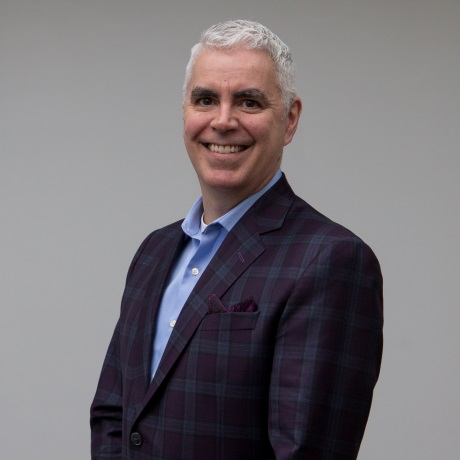
Funders and global rankings want researchers to make an impact on local and global grand challenges but your research can’t move the needle on SDGs (for example) on its own. Generating and assessing research impacts has become its own “grand challenge” for researchers and universities across the world now that impact is emerging as a global conversation. Impact looks different in different countries and in difference disciplines when collaborating with research partners from different sectors. All these differences preclude templated efforts at research impact, but some practices are starting to emerge informed by research on research impact. David Phipps will connect the dots between theories and practices of research impact. Drawing on examples from around the world, academic researchers and students, their research collaborators as well as impact practitioners and research administrators will learn how to apply theories and models to help address the grand challenge of impact.
Biography
David J. Phipps, Ph.D., MBA
Executive Director, Research & Innovation Services
York University
Dr Phipps manages all research grants and agreements including knowledge and technology transfer for York University. He has received honours and awards from the Canadian Association of Research Administrators, Institute for Knowledge Mobilization, International Network of Research Management Societies and the EU based Knowledge Economy Network. He received the Queen Elizabeth II Diamond Jubilee Medal for his work in knowledge mobilization and was named the most influential knowledge mobilizer in Canada. He sits on knowledge mobilization committees around the world and is Network Director for Research Impact Canada.
Twitter: @mobilemobilizer
The Poetry and Music of Science, and the Role of Creativity in Science and Arts
Professor Tom McLeish - The Poetry and Music of Science, and the Role of Creativity in Science and Arts
11 March 2020
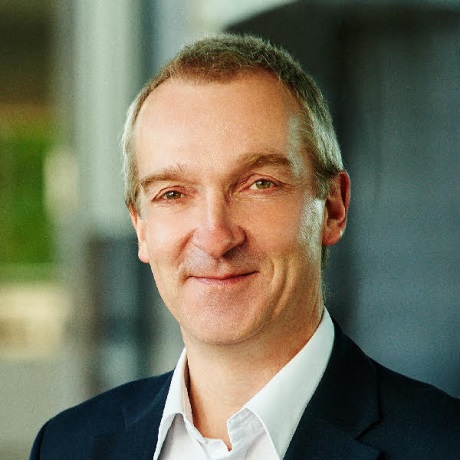
"I could not see any place in science for my creativity or imagination", was the explanation, of a bright school leaver to the author, of why she had abandoned all study of science. Yet as any scientist knows, the imagination is essential to the immense task of re-creating a shared model of nature from the scale of the cosmos to the smallest subatomic structures. A four year project led to the book, The Poetry and Music of Science (OUP 2019), which takes a journey through the creative process in the arts as well as sciences. The lecture draws on both past testimony and contemporary accounts of scientists, artists, mathematicians, writers, and musicians today to explore the commonalities and differences in creation. Tom McLeish finds that the ‘Two Cultures’ division between the arts and the sciences is not after all, the best classification of creative processes. Instead, the three modes of visual, textual and abstract imagination have woven the stories of the arts and sciences together. The lecture concludes by asking how creativity contributes to what it means to be human.
Biography
Tom McLeish, FRS, is Professor of Natural Philosophy in the Department of Physics and also in the Centre for Medieval Studies at the University of York, UK. His research in ‘soft matter and biological physics,’ is highly interdisciplinary, including industrial collaboration. He has published at academic and popular levels in theology/science and humanities/science issues including the books Faith and Wisdom in Science (OUP 2014) and The Poetry and Music of Science (OUP 2019). He is currently Chair of the Royal Society’s Education Committee and a Trustee of the John Templeton Foundation.
Twitter: @mcleish_t
Is the UK food secure? Does it matter?
Professor Tim Lang - Is the UK food secure? Does it matter?
5 February 2020
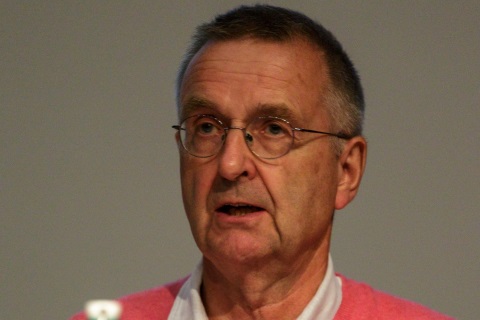
Preparations for no-deal Brexit exposed how the UK food system is stretched. After bland reassurances that all was well, when the ‘Yellowhammer’ papers were leaked in autumn 2019 and finally released, they suggested considerable fragility in our current supply system. This lecture will explore the many paradoxes about the UK’s food. By many measures, it is unsustainable, contributes to massive health problems (many of which are paid for by the NHS), and is locked into an economic dynamic which squeezes primary producers. Yet it is the biggest employer (4 million jobs) and has brought the average household expenditure on food down from 30% in the 1950s to about 10% today. It produces so much food we waste a quarter. This lecture raises questions we now should ask. Can we unlock the ‘lock-ins’ which analysts now say characterises the supposed successes of UK food? Is there sufficient public pressure to do this? Who and what gains or loses? If we want to change such a finely-tuned and delicate system, how could we do this? Most importantly perhaps, it considers whether we can afford not to.
Biography
Tim Lang is Professor of Food Policy at the Centre for Food Policy, City University of London. After a PhD in Psychology at Leeds University in the 1970s, he became a hill farmer in Lancashire for 7 years, which has inspired his work ever since. He researches the role of policy in shaping and responding to the food system, particularly in relation to health, environment, social justice, the political economy and consumer culture.
He has worked for decades on how policy-makers do and do not address the mismatch of food and social systems with planetary and human health, and on what consumers and civil society can do about it. He been a member of many UK Government bodies (eg UK Council of Food Policy Advisors, 2008-10, Sustainable Development Commission 2006-11), and Parliamentary Committees (e.g. advising 4 Select Committee inquiries). He chaired the Scottish Government’s review of food and health strategy in 2004-6. He has advised the European Commission and Parliament, and various UN agencies (WHO, FAO, UNEP). In 2016-19, he was Expert on the European Economic & Social Council’s 2017 inquiry into a comprehensive EU Food Policy and again on the Opinion on Sustainable Diets (March 2019). He set up, chaired and now is Special Advisor to the inter-university Food Research Collaboration of 550+ British academics and civil society researchers working for a better food system (2014-20). He was PI on the EU 7th Framework GLAMUR study (2014-16) on the local/global in food systems and PI on the Hefce-funded IFSTAL project creating innovative links for food-related post-graduate education on food systems with Oxford, Reading, Warwick and London Universities (2014-19). He is President of the UK’s organic gardening and was elected a Fellow of the Faculty of Public Health (2001) and Fellow by distinction in 2014. He was made a Freeman of the Worshipful Company of Cooks of London in 2016.
He is the author of 200 papers, reports and books. He is co-author of Sustainable Diets (2017), Food Wars (2015, ed 2), Unmanageable Consumer (2015, ed 3), Ecological Public Health (2012), Food Policy (2009), Atlas of Food (2008). He was policy chair and co-author of the EAT-Lancet Commission Food in the Anthropocene report into feasibility of healthy diets from sustainable food systems (The Lancet, Jan 16 2019). His new book, Feeding Britain: our food problems and how to fix them, is to be published by Penguin in March 2020, and focusses on what the UK ought to and could do about its food system, Brexit or no Brexit.
Twitter: @ProfTimLang
Eyes wide shut: does UK higher education care about racial justice?
Dr Nicola Rollock - Eyes wide shut: does UK higher education care about racial justice?
20 January 2020
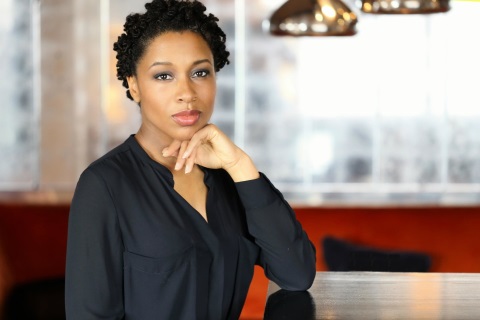
From the persistence of the degree awarding gap to the pervasiveness of racial harassment, UK higher education has a poor track record on race and racism. This keynote address explores the nature of this criticism in light of the speaker’s own research examining the career experiences and strategies of UK Black female Professors. Dr Rollock demonstrates how these women have purposefully and diligently worked to navigate a system characterised by bullying, undermining and shifting markers of success. She reflects on whether the sector is really ready to think critically about advancing racial justice and improving the experiences and success of racially minoritised students, faculty and staff.
Biography
Dr Nicola Rollock is an academic, consultant and public speaker specialising in racial justice in education and the workplace. She was appointed, at the start of 2019, as the Specialist Adviser to the Home Affairs’ Select Committee inquiry - the Macpherson Report 20 Years On - which is examining whether there has been progress in meeting the 70 recommendations published in 1999.
Her most recent research examines the career experiences and strategies of UK Black female Professors, the findings of which were widely covered in the press including WonkHE, The Guardian, Stylist magazine and British Vogue.
Nicola is a member of the Wellcome Trust’s Diversity & Inclusion Steering Group and the British Science Association’s Equality, Diversity & Inclusion Advisory Group. She is also a judge for the JP Morgan sponsored ‘Stories of Black Leadership’ series which showcases successful Black female leaders and for the Powerlist of Britain’s most influential people of African and African Caribbean heritage.
2019
Interdisciplinary Learning and Teaching Conference : Practice and Knowledge Production
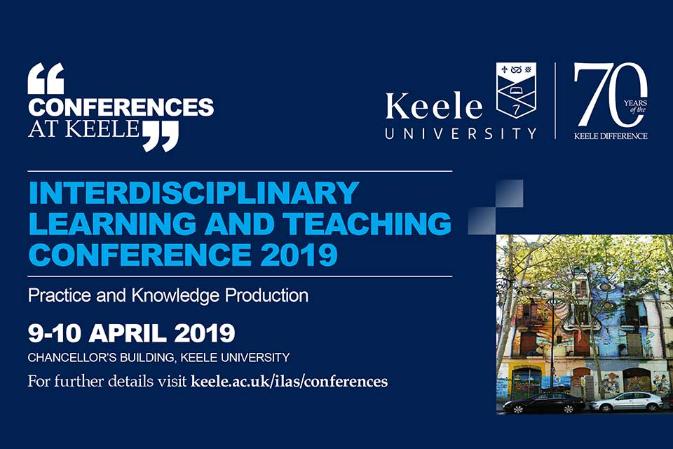
At Keele University, we were delighted to host the 2019 Interdisciplinary Learning and Teaching Conference. Interdisciplinary teaching, scholarship and research are increasingly prioritised within Higher Education and there are many developing opportunities, programmes and examples of innovative and best practice to be disseminated to a wider audience. Applicants were invited to share their research, practice and interdisciplinary knowledge with us.
The conference themes focused on the design, development and delivery of interdisciplinary study, research, and learning and teaching across the UK.

Parallel Paper sessions were held on 9 April with a Discursive Panel, and a Student-Led Workshop and poster presentations on 10th April.
You can view the shared papers from the conference, as well as a copy of Dr Machiel Keestra's presentation on the Interdisciplinary Learning and Teaching UK website here.
You can download a copy of the conference programme here: Conference Programme
Keynote Speaker - Dr Machiel Keestra
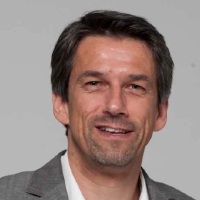
The future and end of interdisciplinarity. What is implied when we aim for more robust interdisciplinary insights?
Registrations have now closed.
Registration fees are as follows:
- £60 - External attendees/participants
- £30 - Keele Staff
- £20 - Students
The conference registration includes refreshments on arrival, lunch and afternoon tea on Tuesday 9th.
Tackling Human Infections in the 21st Century - Opportunities and Challenges?
Professor Janet Hemingway - Tackling Human Infections in the 21st Century – Opportunities and Challenges
11 December 2019
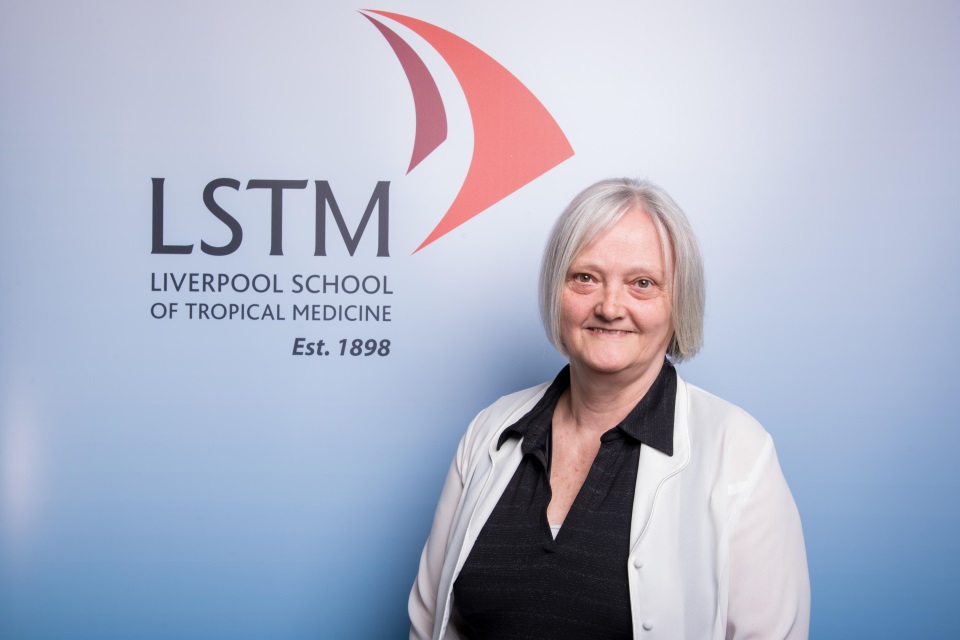
Human infections are still a major cause of morbidity and mortality. Antimicrobial resistance threatens our ability to treat simple bacterial infections, diseases such as malaria have been drastically reduced but remain a major killer, other such as filariasis and visceral leishmaniasis may be eradicated as a public health problem in the next decade, while diseases such as dengue and ebola continue to increase. Major breakthroughs in personalised medicine, gene therapy and our ability to collect and analyse large data represent opportunities to bring new approaches to tackling human infections. How tractable are they to such approaches, what are our priorities in attempting to reduce the global burden of disease, what progress has been made and what challenges remain? Looking at these grand challenges the talk will summarise progress to date in some of the major insect borne diseases and highlight the challenges that still remain if we are to adopt sustainable integrated solutions to tackling human infections.
Biography
Janet Hemingway is Professor of Vector Biology at the Liverpool School of Tropical Medicine. She is also a Senior Technical Advisor on Neglected Tropical Diseases for the Bill and Melinda Gates Foundation. Janet has been PI on projects in excess of £60 million including the Bill and Melinda Gates Foundation funded Innovative Vector Control Consortium. Professor Hemingway was appointed the Director of LSTM in 2001 and stepped down on 1st January 2019, having overseen a period of exceptional growth of the organisation.
Can meaningful hope spring from revealing the depth of our climate failure?
Professor Kevin Anderson - Can meaningful hope spring from revealing the depth of our climate failure?
27 November 2019
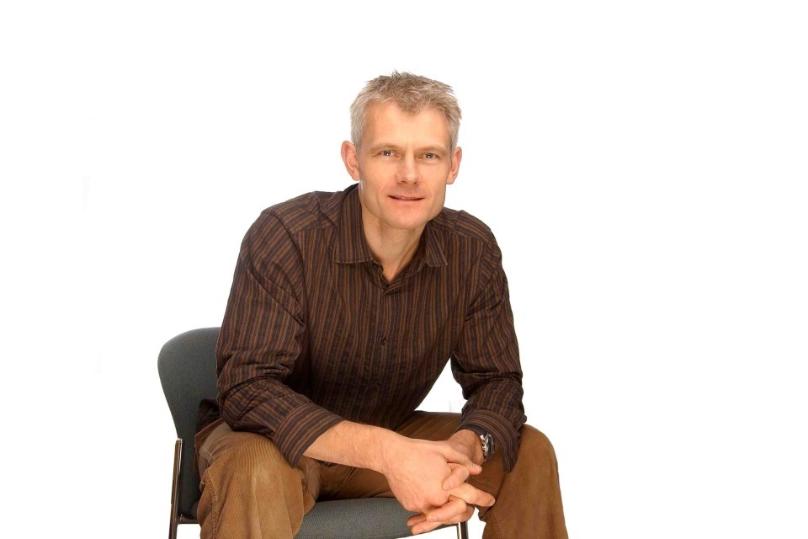
Peel away the layers of dangerously naïve hope and unfounded optimism and the mitigation challenge posed by the Paris Agreement now demands the rapid and profound re-shaping of contemporary society. Whilst the models dominating the mitigation agenda employ evermore exotic and speculative technologies to remain ‘politically palatable’, the arithmetic of emissions increasingly embeds equity at the heart of any mathematically cogent strategy. Dress it up however we may like, the Parisian mitigation agenda is ultimately a rationing issue. Until we are prepared to acknowledge this, we will continue our reckless pathway towards a 3-5°C future.
Against such a depressing backdrop, do the rapid emergence of new and vociferous constituencies and the heightened profile of climate change suggest early cracks and the prospect of new light?
Biography
Kevin Anderson, Professor of Energy and Climate Change - Universities of Manchester (UK) and Uppsala (Sweden)
Kevin Anderson holds a joint chair between the School of Mechanical, Aerospace and Civil Engineering (MACE) at the University of Manchester and the Centre for Environment and Development (CEMUS) at Uppsala University. He has just completed two years as the Zennström Professor of climate change leadership at Uppsala and previously held the roles of Deputy Director and Director of the Tyndall Centre for Climate Change Research. Kevin is research active with publications in Science, Nature and Nature Geosciences.
Kevin engages widely across all tiers of government (EU, UK and Sweden) on issues ranging from shale gas, aviation and shipping to the role of climate modeling (IAMs), carbon budgets and ‘negative emission technologies’. With Manchester colleagues, his analysis previously contributed to the framing of the UK’s Climate Change Act and the development of national carbon budgets.
Kevin has a decade’s industrial experience, principally in the petrochemical industry. He is a chartered engineer and a fellow of the Institution of Mechanical Engineers.
Twitter: @kevinclimate
The Jubilee principle, Martin Dent and the ongoing global financial crisis
Ann Pettifor - The Jubilee principle, Martin Dent and the ongoing global financial crisis
13 November 2019
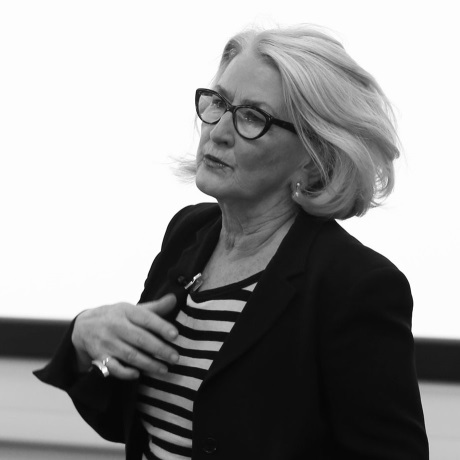
The most striking outcome of the global financial crisis of 2007-9 was the stunned impotence of policy makers – politicians, technocrats and central bankers. They were either unable to fix the global economy or consciously chose not to do so. After the crisis, no structural change was made to the system at the core of the crisis: the international financial architecture. Instead business was made better-than-usual for those that caused the crisis, as most too-big-to-fail financial institutions were backed by government guarantees and central bank largesse in the form of QE and low rates.
Policy-makers imposed two key policies on the flawed globalized model: monetary easing (QE and low rates) and fiscal consolidation (austerity). Incomes across the world fell, while insecure employment and private debt rose to 319% of global GDP (IMF). Borrowing by English higher education institutions has ballooned since 2009, as has student debt. Simultaneously the finance sector (or the 1%) became the main beneficiary of central bank largesse. These policies increased corruption and fraud, intensified inequality, insecurity and led to political insurgencies around the world. Dependent on central bank ‘life support’ the heavily indebted global economy is increasingly prone to volatility and to a range of destabilizing shocks including the breakdown of earth’s life support systems. What lies ahead?
This event also marked the launch of the inaugural Martin Dent Justice and Peace Memorial Lecture to honour Professor Martin Dent’s life and work.
Twitter: @AnnPettifor
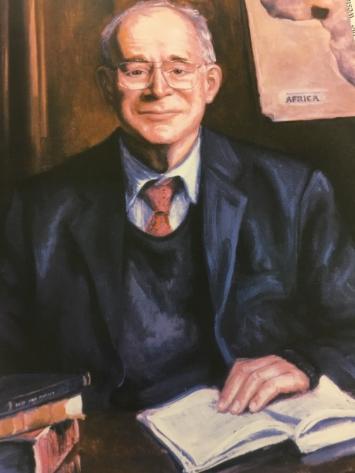
Professor Martin Dent
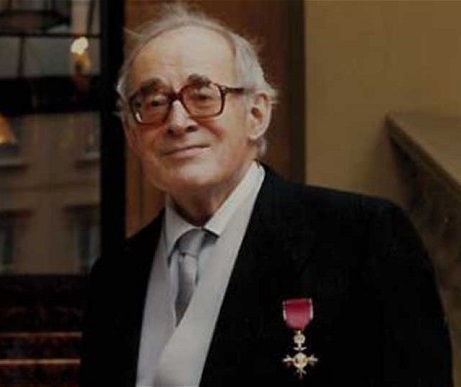
The Faculty of Natural Sciences Equality, Diversity and Inclusion committee and the Institute of Liberal Arts and Sciences were delighted to welcome Dr Claire Hardy to Keele in the same week as International Menopause Day which this year took place on Friday 18th October 2019
Dr Hardy is an expert in women's health across the lifespan and has a special interest in menopause in the workplace. In her presentation, she introduced the menopause and issues relating to the workplace, sharing findings from her research. The symptoms and signs of the menopause are different for every single woman. Around 80% of women will suffer from the typical side-effects, such as; changes in periods, hot flushes & night sweats.
Dr Hardy stressed that there are many positives to reaching the menopause stage, such as:
- no more periods
- no more PMS
- no more pregnancy/need for contraception
- more time to focus on self and personal growth
What can we do at work to help?
- Be aware of difficulties for some staff
- Talk. Empower employees to disclose with managers without fear of sanction
- Allow flexible working
- Set up formal & informal support networks
- Provide accurate & evidence-based information
It was a fascinating and important lecture about a subject that needs to be discussed in the workplace so that this is no longer seen as a taboo subject.
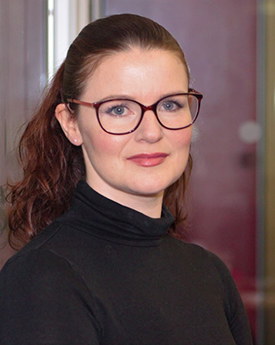
Dr Claire Hardy
Deeds Not Words: The Story of Women’s Rights, Then and Now
Dr Helen Pankhurst - Deeds Not Words: The Story of Women’s Rights, Then and Now
9 October 2019
Helen Pankhurst led a participatory and wide-ranging discussion on women’s lives, reflecting on the changes since the right to a parliamentary vote was first granted to some women in the UK in 1918.
The session was in three parts with questions during and after each. It started with personal reflections from Helen, a direct descendent of the famous Pankhursts, on the Votes for Women campaign and the role of the suffragettes; Second, it explored how far we have come in the last hundred years, looking at and contrasting progress in areas such as in politics, money and work and women’s identity. The session ended with a discussion about priorities going forward.
The participatory lecture was informed by findings from her book Deeds Not Words: The Story of Women’s Rights, Then and Now.
Helen Pankhurst CBE is an author, a women’s rights activist and an international development practitioner.
Helen studied at Sussex University, Vassar College, New York, and Edinburgh University and has an honorary degree from Edge Hill University. She was a Visiting Professor/Senior Fellow at LSE, is a Visiting Professor at MMU and the First Chancellor of the University of Suffolk.
Helen is a Senior Advisor for CARE International, based in the UK and in Ethiopia. She previously worked for other international development charities including WaterAid, Womankind Worldwide and ACORD. She is currently a Trustee of ActionAid and, in 2019, one of the judges of the Orwell Prize for Political writing.
The great-granddaughter of Emmeline Pankhurst and granddaughter of Sylvia Pankhurst, leaders of the British suffragette movement, Helen carries on the legacy. This has included undertaking re-enactment work for current-day awareness-raising including at the Opening Ceremony of the 2012 London Olympics, the 2015 film Suffragette, leading CARE International’s annual #March4Women event ahead of International Women’s Day in London launching the Centenary Action Group and the Greater Manchester initiative GM4Women2028. She has worked with the composer Lucy Pankhurst, on the lyrics of the Emmeline Anthem commissioned by BBC Radio 3 and in 2018 published the book: Deeds Not Words, the Story of Women’s Rights, Then and Now.
Twitter: @HelenPankhurst
Video available at https://www.youtube.com/watch?list=PLm6S_-wsxg6AeXE9FdVKZOHKsAn66KXKf&v=CX2RhcLe5xw
The Postgenomic Condition: Ethics, Justice, Knowledge After the Genome
Professor Jenny Reardon - The Postgenomic Condition: Ethics, Justice, Knowledge After the Genome
23 May 2019
Can Genomics Be Anti-Racist?
At the end of the last millennium, the proposal of the Human Genome Diversity Project and the publication of Herrnstein and Murray’s (1994) controversial bestseller, The Bell Curve, sparked worries that the new science of genomics would reignite scientific racism. Since WWII, human geneticists had labored to distance the study of human genes from eugenics and the Nazi regime. Would that work be undone before genomic research had even really begun? To avert this possibility, in the wake of the sequencing of the human genome—or the postgenomic era—genome scientists and their supporters proposed a new ‘democratic’ approach to genomics. In several high profile cases, they proposed to give power back to “the people” to define themselves, and to control use of their DNA. Yet the problem of race and racism persisted. From the International HapMap Project, to David Reich’s March 2018 editorial in the New York Times, this talk explains how and by what means debates about ‘race’ and racism remain central and formative of the postgenomic condition.
Jenny Reardon is a Professor of Sociology and the Founding Director of the Science and Justice Research Center at the University of California, Santa Cruz. Her research draws into focus questions about identity, justice and democracy that are often silently embedded in scientific ideas and practices, particularly in modern genomic research. Her training spans molecular biology, the history of biology, science studies, feminist and critical race studies, and the sociology of science, technology and medicine. She is the author of Race to the Finish: Identity and Governance in an Age of Genomics (Princeton University Press, 2005) and The Postgenomic Condition: Ethics, Justice, Knowledge After the Genome (Chicago University Press, Fall 2017). She has been the recipient of fellowships and awards from, among others, the National Science Foundation, the Max Planck Institute, the Humboldt Foundation, the London School of Economics, the Westinghouse Science Talent Search, and the United States Congressional Committee on Science, Space and Technology.
Brexit and the End of the British Empire
Professor Danny Dorling - Brexit and the End of the British Empire
15 May 2019
From Brexit the British may learn a great deal about themselves as a result of having voted to 'Leave'. Not least that Britain, and even Brexit, has its roots in the British Empire. Traditionally British Geography, a subject that was partly born in its current form in Britain due to Empire, has not been very good at explaining what the Empire was and why it mattered so much to Britain. Brexit may well be the point at which the English, in particular, finally learn about the importance of geography. Geography is central to Brexit - from the Irish border through to the modern day priorities of India. In hindsight, living with the highest rate of income inequality in Europe was arguably the real problem for the British, rather than being in the EU per se. The source of British woes was not immigrants or some perceived lack of sovereignty, but of their own making, and possibly (at least in part) an outcome of having so recently been at the heart of the largest empire the world has ever known.
Danny Dorling is the Halford Mackinder Professor in Geography at the University of Oxford. He was previously Professor of Geography at the University of Leeds and the University of Sheffield, and earlier held academic posts in Newcastle, Bristol, and New Zealand. His most recent books are ‘Peak Inequality’ (with Sally Tomlinson), which was published in 2018 and ‘Brexit (“Rule Britannia”)’, published in January 2019.
You can download the slides from Danny Dorling's lecture here: Slides from Danny Dorling lecture on 15 May 2019
Interdisciplinary Learning and Teaching Conference
2019 Interdisciplinary Learning and Teaching Conference
9-10 April 2019

At Keele University, we were delighted to host the fourth Interdisciplinary Learning and Teaching Conference. Interdisciplinary teaching, scholarship and research are increasingly prioritised within Higher Education and there are many developing opportunities, programmes and examples of innovative and best practice to be disseminated to a wider audience. The conference gave delegates an opportunity to share their research, practice and interdisciplinary knowledge.
Conference themes focused on the design, development and delivery of interdisciplinary study, research, and learning and teaching across the UK and included keynote speaker Dr Machiel Keestra, assistant professor (UD) at the Institute for Interdisciplinary Studies at the University of Amsterdam.
The two day conference included parallel paper sessions, a discursive panel, a student-led workshop and poster presentations.
You can download a copy of the conference programme here: Conference Programme
What are universities for now?
Institute of Liberal Arts and Sciences partnership event with the Keele Institute for Social Inclusion
3 April 2019
As we enter our 70th anniversary year, it is a time to reflect on Keele as a university with a long and proud history, one that responds to the needs of a modern and rapidly changing society. In 1949, Lord Lindsay, our founder and a great and innovative educationalist, outlined a powerful vision for the purpose of a university in an era of post-war austerity. He was clear that universities have a key role to play in enriching democratic societies so that they would become ever more inclusive, civilized and enlightened.
In 2019, we face a future that is at least as uncertain as it would have seemed to Lindsay and his contemporaries 70 years ago. All universities face unprecedented challenges and questions about their purpose and value, and it is ever more important that we seek to clarify what the broad purpose of universities is in the twenty first century.
Updating Lindsay’s vision
One way to update Lindsay’s compelling vision and to make it clearly relevant to the needs of the future is to unearth its enduring underpinning values. We might consider the core value at the heart of that vision to be social freedom, that is the ways in which individual autonomy can be facilitated through forms of social co-operation that are mutually beneficial. Universities promote social freedom by supporting students in ways that not only enhance their personal freedom, but also their productive freedom, through the world of paid and unpaid work, and their political freedom as engaged citizens of the world. Through its research and various forms of partnership, universities can also be instruments of social freedom that have positive impacts on the wider society in the economic, political and cultural spheres.
This one-day conference brought together students, academics and practitioners to debate the role of universities today by exploring their potential as instruments of social freedom. If we are to remain committed and true to a vision that highlights the transformative potential of universities in enhancing the freedom of all, students, staff, alumni and wider society, then we need to ask what it would mean for us to lead the way in realising this vision today.
Politicising our wrinkles: using optimism to challenge anti-ageing culture
Professor Jayne Raisborough - Politicising our wrinkles: using optimism to challenge anti-ageing culture
13 March 2019
Ageing is gendered. Women’s longevity and their position in gendered pay/ pension inequalities leave many women exposed to precarity and hardships in later life. Additionally ‘anti-ageing culture’ recasts age as a something that can be repaired and reversed. This can mean that women face a cultural expectation to engage with expensive, painful and environmentally-damaging beauty regimes to ‘manage’ or ‘fight’ signs of ageing. That this is moralised site is evidenced by women being accused of ‘letting themselves go’ as they age. This makes for a bleak picture of contemporary ageing, yet women can and do resist the moral imperative to reverse age and they do find other forms of asserting self-worth and identity in a culture that threatens to erase any non-compliant bodies. Drawing upon findings from an ‘antidote to anti-ageing ‘ project and the voices of 60 women, aged from 40- 101 years, Professor Raisborough considers the ways that women’s responses to anti-ageing are formed, informed and lived out and how their ambitions to age on their own terms are shaped. From an optimistic perspective and listening and learning from our aging rebels, she argues for continued attention to the ways that we resist and negotiate anti-aging and challenges feminism to act as a better resource for older women.
Jayne Raisborough is Professor of Media, within the School of Cultural Studies and Humanities at Leeds Beckett University. Her work broadly focuses on two questions: who can we be and how can we live in prevailing socio-economic contexts? These questions are explored across a range of journal articles and her most recent books: Lifestyle Media and the Formation of the Self (2011 Palgrave) and Fat Bodies, Health and the Media (2016 Palgrave). She has explored, published and taught on media/ cultural representations of social class, gender, ethical consumption, litter and more recently anti-ageing and women’s gun ownership. While these sites are diverse, they each represent specific manifestations of ‘responsiblised’ citizenship and allow insight into a cultural shaping of new subjectivities. She is interested in what is enabled and enacted through this responsiblization and shaping - particularly because these activities relate to prevailing neoliberal rationalities.
How do we challenge the stealthy world of digital surveillance?
Professor Beverley Skeggs - How do we challenge the stealthy world of digital surveillance?
27 February 2019
A copy of the Powerpoint presentation from the lecture can be downloaded by clicking the link here: Bev Skeggs Powerpoint Presentation (27MB)
When every nanosecond of our existence is being tracked for advertising potential, should we worry? When every action on phones, computers and even in front of TVs is being stored, what should we think? When the future of nations is being gamed by hidden forces, for example, Cambridge Analytica’s political activities on Facebook, how should we respond? Is there anything that we can do?
Drawing upon findings from a recent interdisciplinary research project which tracked the trackers to try to understand values and value, Professor Bev Skeggs will show how digital systems are creating inequality in new ways and will ask what is to be done to take control of the digital world for the first time.
Bev Skeggs is the Director of the Atlantic Fellows Programme at the LSE. Before taking up this post she was Professor of Sociology, at Goldsmiths, University of London. She has published The Media; Issues in Sociology (1992); Feminist Cultural Theory (1995); Formations of Class and Gender (1997); Class, Self, Culture (2004); Sexuality and the Politics of Violence and Safety (2004) (with Les Moran) and Feminism after Bourdieu (2005) (with Lisa Adkins), and with Helen Wood, Reacting to Reality TV: Audience, Performance, Value (2012) and Reality TV and Class (2012). Between 2013-16 she was an ESRC Professorial Fellow working on a “sociology of values and value" that included projects on the digital economy and prosperity theology.
What is the role of people in an age of intelligent machines?
Dr Joanna Bryson - What is the role of people in an age of intelligent machines?
13 February 2019
Artificial intelligence (AI) and the information age are bringing us more information about ourselves and each other than any society has ever known. Yet at the same time it brings machines seemingly more capable of every human endeavour than any human can be. What are the limits of AI? Of intelligence and humanity more broadly? What are our ethical obligations to machines? Do these alter our obligations to each other? What is the basis of our social obligations?
In this talk I will argue that there are really only two problems humanity (or any other species) has to solve. These are sustainability and inequality, or put another way, security and power. Or put a third way, how big of a pie can we make, and how do we slice up that pie. Life is not a zero-sum game; we and many other species use the security of sociality to construct public goods where everyone benefits. But still, every individual needs enough pie to thrive, and this is the challenge of inequality. I will argue that understanding these processes answers the questions above, and then will look at how AI is presently affecting both these problems. I will close with concrete policy recommendations for managing AI and our society.
Dr Joanna Bryson is an Associate Professor (Reader) at the University of Bath. Dr Bryson’s first and third degrees were in Psychology (Chicago, Edinburgh), while her second and fourth were in Artificial Intelligence (Edinburgh, MIT), so she approaches AI from the perspective and for the purpose of understanding human behaviour. Before her postgraduate education she did programming and system administration in Chicago's financial industry, and has since consulted for a number of companies on AI, notably LEGO. She has worked off and on in AI ethics since 1996, and helped author the UK research councils’ Principles of Robotics in 2010. In the last two years she’s consulted to the Swiss National Science Foundation and the Canadian Institute for Advanced Research on researching the impact of AI on society, the Red Cross on autonomous weapons, Chatham House on the impact of AI on the nuclear threat, and the British Parliament, the British Financial Conduct Authority, the European Parliament and Commission, the Council of Europe, and the OECD regarding the regulation of AI.
How can we cure disease?
- Professor Daniel M Davis - How can we cure disease?
- 30 January 2019
The immune system holds the key to human health. In this talk, Daniel M. Davis will describe the scientific quest to understand how it works – and how it is affected by stress, sleep, age and our state of mind – and explain how this knowledge is now unlocking a revolutionary new approach to medicine and well-being.
The body's ability to fight disease and heal itself is one of the great mysteries and marvels of nature. But within the last few years painstaking research has resulted in major advances in our understanding of this breathtakingly beautiful inner world: a vast and intricate network of specialist cells, regulatory proteins and dedicated genes that are continually protecting our bodies. Far more powerful than any medicine ever invented, it also plays a crucial role in our daily lives. Already we have found ways to harness these natural defences to create breakthrough drugs and so-called immunotherapies that help us fight cancer, diabetes, arthritis and many age-related diseases, and we are starting to understand whether or not activities such as mindfulness might play a role in enhancing our physical resilience.
Daniel M Davis is a Professor of Immunology at Manchester University. His research, using super-resolution microscopy to study immune cell biology, was listed in Discover magazine as one of the top 100 breakthroughs of the year. He is the author of THE COMPATIBILITY GENE, described by Bill Bryson in the Guardian’s Books of the Year as ‘elegantly written and unexpectedly gripping’. His most recent book, THE BEAUTIFUL CURE, has been described by Stephen Fry as 'One of those books that makes you look at everything human in a new, challenging and thrilling way'. He has published well over 120 academic papers, cited over 10,000 times, including articles in Nature, Science and Scientific American.
Reflections on the (in)compatibilities of social justice and HIV vaccine research agendas in resource-poor communities in South Africa
- Dr Anthea M. Lesch - An ILAS and Community Animation and Social Innovation Centre (CASIC) partnership event.
- 22 January 2019
In this talk I reflect on my experiences as community health psychologist conducting qualitative social science research on HIV vaccines in South Africa. My reflection centres on the competing narratives of social justice, community engagement and scientific research that confront me in my work. Positioning myself as scholar-activist, I discuss the challenges that arise at the intersection of qualitative research on community engagement in HIV vaccine research and the process of scientific experimentation.
HIV vaccine research spans complex relationships between local and global stakeholders. In South Africa, HIV vaccine research takes place amongst the most vulnerable and marginalised populations. Communities who host HIV vaccine research are the victims of oppression, reflected in the enduring impact of structural inequalities that threaten their health and well-being. They become the target for HIV vaccine research participation due to their elevated risk of HIV infection. Clinical trials to test candidate HIV vaccines bring resources into local communities. Participation in HIV vaccine research mediates community members’ access to these resources.
Researchers and trial funders emphasise the crucial role that local communities play in the successful development of a safe and efficacious HIV vaccine. Power hierarchies between researchers, funders and local communities reproduce inequalities and challenge notions of equal partnership and mutual benefit. Community engagement processes designed to promote participation in HIV vaccine research continue to fulfil an ethical and operational function, neglecting issues of community capacity-building and empowerment.
Dr Anthea M. Lesch is a lecturer, scholar, activist and qualitative researcher based in the Psychology Department at Stellenbosch University in South Africa. Her work adopts a community psychological approach to examining inequality and its impact on the health and well-being of marginalized and oppressed groups in society. Her current research focusses on community engagement in communities affected by HIV/AIDS, black women’s sexual and reproductive health, the lived experiences of people living on the streets of urban Cape Town and exploring narratives about race, racism and the racial collective consciousness in contemporary South Africa.
Dr Anthea Lesch is an ILAS visiting fellow hosted by Dr Lisa Dikomitis, Institute for Primary Care and Health Sciences (iPCHS) and School of Medicine and Professor Mihaela Kelemen, Director of the Community Animation and Social Innovation Centre (CASIC).
2020-2030: The Most Critical Decade in Humankind’s Short History
- Sir Jonathon Porritt - A partnership event with the Institute for Sustainable Futures
- 16 January 2019
2018 was a shocking year for humankind in terms of accelerating climate change, loss of species and habitats, worsening pollution problems, and serious setbacks on governance, human rights and poverty alleviation issues. Plus an extra 75 million people by the end of the year.
To point out that this is literally ‘unsustainable’ is blindingly obvious – but politicians are still not in listening mode. So how can we, in Higher Education and elsewhere, double-down on today’s inspiring solutions agenda? And should we now be embracing a new era of much more radical direct action?
Sir Jonathon Porritt, Co-Founder of Forum for the Future, is an eminent writer, broadcaster and commentator on sustainable development. Established in 1996, Forum for the Future is now the UK’s leading sustainable development charity. The Forum has a growing presence in the United States, India, Hong Kong, Singapore and Malaysia. In addition he is President of The Conservation Volunteers, a Non-Executive Director of Willmott Dixon Holdings, a Trustee of Ashden, and a Director of Collectively (an online platform celebrating sustainable innovation). He was formerly Director of Friends of the Earth, co-chair of the Green Party and as Chairman of the UK Sustainable Development Commission until 2009, he spent nine years providing high-level advice to Government Ministers. Jonathon was installed as the Chancellor of Keele University in February 2012. He is also Visiting Professor at Loughborough University and UCL. Recent books are ‘Capitalism As If The World Matters’ (2007) and ‘The World We Made’ (2013) - which seeks to inspire people about the prospects of a sustainable world in 2050. Jonathon received a CBE in January 2000 for services to environmental protection.
2018
Knowledge and a transforming world
- Professor Ioan Fazey - Green Keele Christmas lecture
- 6 December 2018
Brought to you in partnership between Keele's Institute for Sustainable Futures and the Institute for Liberal Arts and Sciences.
Humanity and the planet are entering a period of major, transformative change in economies, political power, human-environment relationships and technology. Whether for the good or for the bad, transformation of society in some way is inevitable. Humanity has therefore no option other than to try and find ways to help steward such transformations towards more equitable and sustainable futures.
Science and knowledge have an important role to play in this process. Yet so far, science and research is arguably failing humanity when its impact is measured against the level of progress being made towards addressing burgeoning global environmental and social crises. Further, for all its brilliant success, science and technology, have led to many of the problems to which transformative responses are now needed, including climate change, obesity, smoking, mental health, plastics in the oceans and premature deaths from air pollution. This raises important questions about the kinds of knowledge and learning needed for, and in, a transforming world.
This Christmas lecture explores these issues, including briefly outlining the origins of scientific thinking and the challenges that have emerged, including the limits of current approaches to knowledge and research in being able to address the problems that science and technology have also produced. Examples will be used to highlight the need for new thinking for the 21st Century, such as in Louisiana where communities are already on the move due to growing impact of sea level rise and where policy professionals are questioning the kinds of governance needed to support inevitable change. New and radical thinking is also required, such as recent work in Bangladesh which has led to the building of resilient floating homes. A key issue is then how new ways of thinking and solutions can be developed, which in turn raises questions about whether the formal ways knowledge is produced, such as that produced in Universities and research institutes, is fit for purpose in a world of major change. Key for this is to find ways to emancipate learning and unleash a new era of creativity that not only produces knowledge about the nature of bio-physical and social phenomena but also leads the development of wisdom about how to act in the world. Overall, this lecture is timely for a Christmas season of both celebration and reflection as it seeks to stimulate thinking about how current ways of thinking about knowledge, knowing and learning has resulted in many benefits for many people but also how such thinking may also need to change to help achieve more equitable and sustainable futures.
Ioan Fazey is Professor of the Social Dimensions of Environmental Change at the University of Dundee and Director of the Centre for Environmental Change and Human Resilience. He has over 60 research publications in knowledge, learning, resilience, vulnerability and sustainability. His work has included innovative projects on community resilience in the South Pacific and Scotland and co-creative projects to build flood resilient floating homes in Bangladesh. He is actively involved in helping support and facilitate emergence of a growing field of research on action on Transformations to Sustainability. This includes convening the Transformations 2017 Conference Series and being a co-founder of the SDG Transformation Forum, and trustee of H3Uni, an action oriented organisation that seeks to promote transformative thinking and capacity for working within a changing world. To find solace from a turbulent world and foster inspiration and support he spends time connecting with the non-human world, including with his dog.
Can women ever win in politics? Reflections on the centenary of women’s suffrage
- Melissa Benn - Grand Challenges lecture
- 5 December 2018
A hundred years ago, women won the qualified right to vote. In the ensuing hundred years, we have seen the rise of many women in politics, much legislation that benefits women’s lives and, more recently, the resurgence of a powerful and intersectional global feminism. But something is still very wrong in our body politic and in civic society, particularly for women without power, influence or ‘voice.’ In this talk, I want to reflect on enduring achievements, new dangers and disputes, and how we might craft a more inclusive and effective politics for the 21st century.
Melissa Benn is a writer and campaigner. She has published numerous articles and essays for publications as diverse as Public Finance and the London Review of Books, and is currently a regular contributor to the Guardian and New Statesman. She has published eight books including two novels and her non-fiction includes the highly acclaimed School Wars: The Battle for Britain’s Education (2011) and What Should We Tell Our Daughters? The Pleasures and Perils of Growing Up Female (2013). She is on the board of the Oxford Women in Humanities group and chair of the national campaign group Comprehensive Future.
A public health narrative for anti-discrimination law
- Professor Iyiola Solanke - Grand Challenges lecture
- 28 November 2018
Despite over 50 years of anti-discrimination law in the UK, reports demonstrate that discrimination has not only endured but in some areas worsened. Why is this? In this talk I suggest that a problem lies in the individualised approach inherent in anti-discrimination law, where an individual victim brings a case against an individual organisation/ employer. I suggest that if this were to be complemented with a social approach, where public action was a norm alongside individual action, anti-discrimination law could be more effective. Drawing upon literature in critical social psychology and methods adopted in public health campaigns, I propose a way to do this.
Professor Iyiola Solanke, is a Professor in the Centre for Law and Social Justice at the University of Leeds where she holds the Chair in EU Law and Social Justice.
Innovation and Knowledge Exchange in Universities: The development of a Knowledge Exchange Framework
- Professor Trevor McMillan - Grand Challenges lecture
- 7 November 2018
Universities play a key societal role in supporting and enhancing the performance of a wide range of communities and organisations at local, regional, national and global scales. The nature of this, though, depends on the characteristics and strategies of individual universities. Academic strengths, portfolio, local environment all play a role in determining the nature and level of interaction with outside bodies. The importance of this has been recognised for some time by government in different ways and it is critical that we can demonstrate the extent and success of knowledge exchange in universities and commit to getting better at it.
A Knowledge Exchange Framework (KEF) should provide a mechanism for assessing performance and approaches to improvement, against the backdrop of the enormous variety of activities carried out in universities, and the variation between universities, in terms of what is appropriate for them to focus on. This lecture will consider the current proposed approaches to a Knowledge Exchange Framework.
Professor Trevor McMillan became Vice-Chancellor of Keele University in August 2015.
Ethics, law and the future of democracy
- Dr Rowan Williams - Grand Challenges lecture
- 16 October 2018
We are living in the aftermath of a referendum. And whatever the rights and wrongs of the particular result, it’s worth asking why we aren’t usually governed by referendum. Democracy in the full meaning has an ethical component, which is in danger if we just go by majority votes: it assumes something about the liberty or dignity of every citizen, and so mandates a certain approach to minorities or dissidents. In this lecture, Dr Williams will look at how this has evolved and how it works - and why and where it may be at risk today.
Dr Rowan Williams, Master of Magdalene College, Cambridge former Archbishop of Canterbury.
Supported by Keele's Centre for Ageing Research (KCAR) and the Institute for Liberal Arts and Sciences (ILAS)
- Late-Life Creativity: an International Showcase
- 28 June 2018
Research into social and cultural gerontology and, more recently, late-life creativity, benefits hugely from the degree to which it can learn from international perspectives, exemplars and communities of practice. Keele and the New Vic Theatre have pioneered the 'Live Age' festival since 2014, based on the New Dynamics of Ageing-funded 'Ages and Stages' project, and experiences learned from a collaboration with the University of Alberta and Edmonton's ground-breaking festival of late-life creativity.
Keele's Centre for Ageing Research (KCAR) is delighted to host Dr Nuria Casado-Gual (University of Lleida) whose internationally-funded Honorary Research Fellowship in Keele’s School of Humanities is enabling her to develop and share her work on late-life creativity in partnership with colleagues at Keele, the New Vic Theatre, and North Staffordshire’s creative writing community.
The showcase will feature Dr Casado Gual, with contributions from Dr Jill Rezzano and members of the Ages and Stages company; Dr Karan Jutla (De Montfort University) on narrative talking therapies among Sikh dementia carers; and David Amigoni on the international dimensions of his forthcoming edited collection (with Gordon McMullan, King's College, London) on late-life creativity.
An interdisciplinary Workshop from the Children and Young People's Research Network with Seedcorn Funding provided by the Institute of Liberal Arts and Sciences (ILAS)
- Addressing children and young people’s health and well-being using a collaborative, interdisciplinary approach
- 26 June 2018
Attendance at this workshop is by invitation only. For more details, please contact Professor Claire Fox, c.fox@keele.ac.uk.
Full details of the workshop programme can be downloaded at
The Ends of Work
- Professor Nicholas Smith - Grand Challenges lecture
- 13 June 2018
One of the great challenges of our times is the current transformation of work and how we should orient ourselves ethically in relation to this transformation. It is popularly argued that as more and more jobs become automated, there will be less and less work to go around, decreasing occupational stability, but no shortage of wealth. In these circumstances, the fundamental moral challenge is to ensure that those who remain in work do not enjoy a disproportionately large share of this wealth, that the growing numbers of unemployed people get their fair share, and that no one is stigmatised for not wanting to work at all. Put simply, to ensure that the benefits - and in particular the freedoms - of the end of work are equally available to everyone. However, the question remains; does this get to the ethical heart of the challenge the transformation of work poses for us? In this lecture I suggest that it does not.
Professor Nicholas H. Smith is Professor of Philosophy at Macquarie University and an Institute of Liberal Arts and Sciences Fellow 2017-8. He has published widely in critical social theory and philosophy of work. His latest book, The Return of Work in Critical Theory: Self, Society, Politics, co-authored with Christophe Dejours, Jean-Philippe Deranty and Emmanuel Renault, is published by Columbia University Press (2018).
Transforming health care in the Philippines: An eyewitness account from a public health transformer
- Dr Manuel M. Dayrit - A School of Medicine event in partnership with the Institute of Liberal Arts and Sciences
- 6 June 2018
Dr Manuel M. Dayrit will talk about his passion for improving health care in the Philippines, particularly for poor people in rural, remote, and underserved communities.
Dr Manuel M. Dayrit served as Secretary of Health of the Philippines (2001-2005). He dedicated his life to improving health care in the Philippines. First as a young community physician in rural Mindanao and later as disease control specialist and Director of Health Promotion at the Philippine's Department of Health. He held senior roles at the WHO. As Director of the Department of Human Resources for Health at WHO, he helped create the WHO Code for the International Recruitment of Health Personel in 2010. He is now Dean of the Ateneo School of Medicine and Public Health in Manila where he leads a faculty dedicated to forming physician-leaders for the country.
Dr Dayrit and Professor Andrew Hassell (Head of Keele's School of Medicine) are Principal Investigators of the Newton-funded iPRIME study. Dr Dayrit is also Co-Investigator of SOLACE, a research project bringing together UK-based and Philippines based researchers from a wide range of disciplinary backgrounds. SOLACE is led by Dr Lisa Dikomitis.
Out of the Wreckage: A New Politics for an Age of Crisis
- George Monbiot - Grand Challenges lecture
- 4 May 2018
A toxic ideology rules the world – of extreme competition and individualism. It misrepresents human nature, destroying hope and common purpose. Only a positive vision can replace it, a new story that re-engages people in politics and lights a path to a better world.
George Monbiot explains how new findings in psychology, neuroscience and evolutionary biology cast human nature in a radically different light: as the supreme altruists and cooperators. He shows how we can build on these findings to create a new politics: a ‘politics of belonging’. Both democracy and economic life can be radically reorganized from the bottom up, enabling us to take back control and overthrow the forces that have thwarted our ambitions for a better society. His new and thrilling vision provides the hope and clarity required to change the world.
George Monbiot writes a weekly column for the Guardian and is the author of a number of books, including How Did We Get Into This Mess?; Heat: How to Stop the Planet Burning; The Age of Consent: A Manifesto for a New World Order; Captive State: The Corporate Takeover of Britain; and Feral: Rewilding the Land, Sea and Human Life. His most recent project is an album, written with the musician Ewan McLennan, called Breaking the Spell of Loneliness.
A Cross-Disciplinary Workshop from the Institute for Science & Technology in Medicine (ISTM) with Seedcorn Funding provided by the Institute of Liberal Arts and Sciences (ILAS)
- Translating stem cell research into a new cell therapy for lung diseases
- 2 May 2018
The workshop will include the following presentations:
- Prof. Nicholas Forsyth - Introduction, Keele
- Prof. Wei Zuo (Keynote) - Adult stem cells and regenerative medicine, Tongji University, China
- Dr Ting Zhang - Commercialization of stem cell therapy, Regend Therapeutics, China
- Dr Lucy Fairclough (Keynote) - Fundamental and biomarker research in COPD, Nottingham University
- Dr Jan Herman Kuiper - Regulatory hurdles in cell therapy: our experience with autologous cartilage cell therapy, RJAH
- Dr Simon Lea/Dr Helen Wright - Ethics and Patient & Public Involvement, R & D, UHNM
- Dr Haris Mohammed - UK lung clinical treatment and challenge, UHNM
- Dr Abigail Rutter - The potential use of Selected-Ion Flow-Tube Mass Spectrometry for lung disease research, Keele
- Prof. Yibin Fu - Constitutive modelling of rubber and biological tissues, Keele
- Dr Simon Pearce - Extracting elastic properties from the indentation of highly curved biological surfaces, Manchester
- Prof. Ying Yang - Establishment of 3D tissue models, Keele
- 1pm Lunch and refreshments
There will be Keynote presentations from Prof Wei Zuo of Tonji University and Dr Lucy Fairclough of Nottingham University.
UKON 2018
- The Sixth UK Ontology Network meeting, supported by the Institute of Liberal Arts and Sciences
- 30 April 2018
The Sixth UK Ontology Network meeting (#ukon2018) will take place on Monday, April 30th, 2018 at Keele University. The aims of this meeting are as follows:
To enable dissemination of ontology and related forms of knowledge representation relevant work from across multiple disciplines
To encourage collaboration and cooperation between different members of UK organisations working in this area
To help establish a research agenda in ontology and better communication with funding councils and industry needs
This event is supported by the Institute of Liberal Arts and Sciences.
For more information, please visit: http://ukontology.org/
Turning Heads: Changing Minds
- ILAS PG Conference 2018
- 19 April 2018
Welcome to the Institute’s third postgraduate conference; a great opportunity to celebrate the fantastic range and diversity of postgraduate work in the University.
All postgraduate students are invited to share their work in progress and present their research, dissertation project and course-related posters to a cross disciplinary audience of peers, students and staff.
Participants are expected to present their work as a poster, although artefacts or performance may also be offered. This is a different and alternative opportunity in addition to those available within the faculties and research institutes and the challenge here is to communicate your work in an accessible and inspiring way to an informed, but non-specialist audience.
We hope that as many research and taught students as possible will wish to take an active part in this innovative conference format; it is an opportunity to gain valuable experience in sharing your work beyond your own field and most importantly to hear and learn more about the diverse range of work being undertaken in different fields and from different perspectives. In this way, your conversations and interactions will encourage new ideas and fresh ways of thinking about your work.
After Brexit, UKRI if you want to: a field guide to the new research landscape
- James Wilsdon - Grand Challenges lecture
- 18 April 2018
The research system is changing, but the need for robust social science, novel methodologies and interdisciplinary analysis of complex problems has never been greater.
We’re about to embark on the biggest shake-up in the organisation of UK research for a generation. On 1 April 2018, implementation of the Higher Education and Research Bill will see the seven Research Councils, Innovate UK and the research arm of HEFCE drawn into the warm embrace of Sir Mark Walport's new mega-funder, UKRI (UK Research and Innovation). Multi-billion pound strategic funds - for global challenges and industrial strategy - are the main source of extra investment in the funding system, forcing universities to think creatively about the projects and cross-disciplinary teams they can assemble. The Research Excellence Framework has been revamped. And all of these reforms are taking place against the backdrop of the compound uncertainties of Brexit.
The external drivers are pressing, how can we prepare for the road that lies ahead? What opportunities - as well as bumps - may lie around the corner? Drawing on his experience at the heart of UK research policy, James Wilsdon will offer a field guide to the shifting contours of the UK research landscape.
James Wilsdon is Professor of Research Policy and Director of Impact and Engagement in the Faculty of Social Sciences at the University of Sheffield. From 2013-2017, he was Chair of the UK's Campaign for Social Science. He also chaired the independent review of the role of metrics in the management of the UK’s research system, which published its final report 'The Metric Tide' in 2015. Previously, James worked as Professor of Science and Democracy at University of Sussex and Director of Science Policy at the Royal Society. He is an editor of the Guardian's 'Political Science' blog on science and research policy. In 2015, he was elected a Fellow of the Academy of Social Sciences.
The ‘Betrayal of White Pupils’ (and other lies we’re told about race and education)
- David Gillborn - Grand Challenges lecture
- 21 March 2018
In April 2016 the front page of the Daily Mail, Britain’s most politically influential newspaper, was dominated by the headline ‘Betrayal of White Pupils’. The subheading stated that ‘By 16, white British children lag behind 12 ethnic groups’.
The story is part of a long running campaign, waged across the mass media and mainstream politics, that presents White people as race victims, ignored by the ‘elite’ and treated as second-class citizens in the face of multiculturalism and political correctness. In education, this lie has been perpetrated by both main political parties and has led to education policy that not only ignores racist inequality, but actively reinforces and worsens the situation.
Contrary to the popular assumption that racism is an occasional aberration seen at times of exceptional stress or social upheaval, this lecture argues that racism is a deeply-rooted characteristic of education in England. The Brexit vote and the election of President Trump have raised the profile of popular racism but at a fundamental level institutional racism and the routine privileging of White people, especially the White middle class, never went away. Migration and social integration are frequently cited as major challenges facing society but this misunderstands the problem; a greater challenge is whether we can move the White majority from its position of assumed dominance and superiority.
David Gillborn is Professor of Critical Race Studies and Director of the Centre for Research in Race & Education (CRRE) at the University of Birmingham. He is best known for his research on racism in educational policy and practice and, in particular, for championing the growth of Critical Race Theory (CRT) internationally. He is founding editor of the peer-reviewed journal ‘Race Ethnicity and Education’ and twice winner of the ‘Book of the Year’ award by the Society for Educational Studies (SES). His international honours include the Derrick Bell Legacy Award, from the Critical Race Studies in Education Association (CRSEA), for career accomplishments that demonstrate ‘personal courage and professional commitment to supporting and advocating race equality in education,’ and membership of the Kappa Delta Pi Laureate Chapter, which is limited to 60 living educators who have made a significant and lasting impact on the profession of education. David is a Fellow of the Academy of Social Sciences and a Fellow of the Royal Society of Arts. His most recent books are ‘The Colour of Class’ (co-authored with Nicola Rollock, Stephen J. Ball and Carol Vincent, 2015) and ‘Foundations of Critical Race Theory in Education’ (co-edited with Edward Taylor and Gloria Ladson-Billings, 2016).
This one-day workshop explores pedagogies of listening and one-to-one communication, and the urgent need for the development of listening skills and the creation of spaces and environments for interdisciplinary and inter-cultural dialogue within higher education, in order to work toward a more sustainable society and future. The workshop draws on the resources and experiences of a HEFCE Catalyst funded teaching innovation project ‘Unmaking Single Perspectives: a Listening Project’ at Keele University.
We can find many examples which demonstrate our lack of willingness to listen to others with different perspectives to our own, but also examples of when listening has led to the avoidance of conflict and to greater understanding. Achieving a more sustainable and just society requires us to hear the voices of those with perspectives different to ourselves, and to work effectively in new partnerships, as reflected in the United Nations Sustainable Development Goals. Yet, in the majority of disciplines in higher education, there is an implicit assumption that ‘communication skills’ means speaking, with a focus on developing skills in presenting to large audiences, or debating and ‘winning’ arguments. Other than within professional practice courses there is rarely much acknowledgement of the need for the development of skills relating to one-to-one communication and understanding of others’ perspectives, despite the crucial role this plays in our personal and professional lives.
This immersive workshop will be of interest to anyone interested in the pedagogies of listening and communication, interdisciplinarity and education for sustainable development. The workshop will explore the creation of spaces and environments for listening within higher or further education and the application of these approaches to an education system tailored to supporting a more sustainable future; and it will introduce resources, activities and techniques conducive to open dialogue and active listening among students from different disciplines that can be adapted to your own context and practice.
You can download a copy of the draft programme here: Dissemination Event Draft Programme
19th March - Keele Hall, Salvin Room 10-4pm
18 April - London South Bank University 10-4pm
23 April – Edinburgh University 10-4pm
The Future of Social Housing after Grenfell
- Anne Power - Grand Challenges lecture
- 21 February 2018
Following the Grenfell fire and all its tragic consequences, the spotlight is on social landlords. They own over four million homes, housing around ten million tenants and nearly half of these live in multi-storey blocks of flats, where safety, security, repair and maintenance are critical.
Tenants are extremely anxious to know that their blocks are safe and that their landlord is taking all essential steps to secure this longer term, however, up to now, the Government has focussed on increasing the numbers of homes built and the needs of first-time buyers to the detriment of social renting. Recent events have sharpened the focus on the urgent need for more social housing at truly affordable rents, the need to invest properly in existing homes and communities and crucially, tenants’ needs to be heard and heeded.
In this lecture Anne Power will discuss the following questions; Can/will social landlords rise to the challenge? Will the government stick to its work to make social housing matter? Will tenants be treated as full citizens with the same housing rights as property owners?
Professor Anne Power has been involved in European and American housing and urban problems since 1965. In 1966, she worked with Martin Luther King's 'End Slums' campaign in Chicago, and, on her return to Britain, organised community-based projects in Islington, Hackney and Tower Hamlets. From 1979 to 1989, she worked for the Department of the Environment and Welsh Office, setting up Priority Estates Projects to rescue run-down estates all over the country. In 1991, she became founding director of the National Communities Resource Centre at Trafford Hall in Chester which provides residential training and pump priming support for people living and working in low-income communities.
Anne became a Professor of Social Policy at the London School of Economics in 1996 and is Head of LSE Housing and Communities, a research group based within the Centre for Analysis of Social Exclusion. She is author of many books, reports and articles on housing, cities and low-income communities and her latest publication Cities for a Small Continent was published in 2016.
A workshop organised by visiting ILAS Fellow, Dr Thibaut Devièse and Dr Szu Shen Wong, Keele University with the support of the Art and Humanities Research Council.
- Royal Pharmaceutical Society, London
- 16 February 2018
Have you ever wondered what goes into your skincare products you use?
Have you ever wondered what makes them smell so nice?
Have you ever wondered how they keep your skin looking healthy?
If so, come and join us for an afternoon of fun family-oriented activities and find out the answers to all your questions!
You will get the chance to try natural cosmetics.
You will also get the opportunity to design (and keep) cosmetic advertisements and packaging.
This follows on from the 'From Past to Present - Natural Cosmetics Unwrapped: Conference' held on 15 February at the Royal Pharmaceutical Society, London.
On 15th February 2018, the Royal Pharmaceutical Society will host a conference focused on the study of natural cosmetics over time. This conference is co-organised by the University of Oxford, the University of Glasgow, Keele University and with the support of the Art and Humanities Research Council (Science in Culture).
For thousands of years, cosmetic products have been made with a range of minerals and organic substances. With the development of long distance commercial routes, the diversity of cosmetics increased drastically during Antiquity. In the last few centuries, many such cosmetics have been produced, marketed, and distributed by the cosmetic industry with classical influences. For example, the recipes of medical writers such as Hippocrates and Galen were sources of inspiration. Mythological and historical figures such as Hygieia and Cleopatra also appeared prominently on the packaging and advertising. Today, some cosmetics are still produced exclusively with natural substances and their advertisements sometimes refer to ancient times.
This conference will offer an opportunity to approach cosmetics from an interdisciplinary perspective, incorporating elements from the disciplines of classics, ancient history, archaeology, bioarchaeology, pharmacy and pharmacology. Subject areas covered include but is not limited to the following:
- Literary and documentary evidence for cosmetics in ancient and historical periods
- Scientific analysis of ancient and historical cosmetics
- Reception of ancient cosmetics in later historical periods and in the contemporary world
- Experimental reconstruction of ancient and historical cosmetics
Can Creativity Save Us?
- Darren Henley - Grand Challenges lecture
- 24 January 2018
The pace and scale of global change can make us all as individuals feel powerless. From the shifting climate to technology that aggregates us as data, our future thinking is dogged by dystopian fear. But this is only one version of the future - there can be many others. In this talk, Darren Henley looks at how creativity - which precipitated these changes - can show us the way forward, and restore our power as individuals.
Darren Henley is Chief Executive of the Arts Council.
He previously spent twenty-five years working in radio, leading Classic FM for fifteen years, first as Managing Editor and then as Managing Director. He was appointed an OBE in 2013 for services to music. Darren has chaired or sat on a range of government advisory boards in the area of cultural education. His two independent government reviews into music education (2011) and cultural education (2012) resulted in the creation of England’s first National Plan for Music Education, new networks of Music Education Hubs and Heritage Schools, the Museums and Schools programme, the BFI Film Academy and the National Youth Dance Company.
He is the author or co-author of thirty books, including The Virtuous Circle: Why Creativity and Cultural Education Count. It argues that an excellent cultural education is the right of everyone, bringing personal, social and commercial advantages that can only benefit the lives of all individuals in our society. In 2016, Darren's most recent most recent book was published. The Arts Dividend: Why Investment in Culture Pays looks in depth at seven key benefits that art and culture bring to our lives.
Darren joined the Arts Council in 2015.



